A clear and well-structured bookkeeping system is the financial backbone for any business, big or small. Yet, nearly 71% of SMOs rely on accounting apps and pen‑and‑paper or spreadsheets to manage finances, exposing themselves to human error and fragmentation.
Well‑maintained bookkeeping helps you stay on top of daily tasks and gives you a clear picture of your cash flow, taxes, and financial health. Organized financial records make better decisions and do better than those who just use outdated methods.
Understanding the Basics of Bookkeeping Systems
To build a smooth foundation for your bookkeeping system, explore essential definitions and why a structured digital or manual setup matters. These core insights pave the way for precise, accurate tracking and financial decision-making.
What Is a Bookkeeping System?
A bookkeeping system is the structured process by which businesses record financial transactions, organize financial data, and produce reliable records for decision-making. It serves as the backbone of financial clarity and transparency.
Businesses use bookkeeping systems to track income, expenses, assets, liabilities, and equity. These records enable timely financial reporting and support audit readiness. Whether conducted manually or digitally, bookkeeping creates accountability and financial discipline.
Why Every Business Needs an Organized Bookkeeping Process
An organized bookkeeping process ensures financial clarity, supports compliance, and drives business growth. Without structure, you risk misclassification, tax errors, or missed deductions.
Here’s what a streamlined process delivers:
- Accurate financial insights
- Tax preparation ease
- Informed decision-making
- Professional presentation
Difference Between Manual and Digital Bookkeeping Systems
Choosing between manual and digital bookkeeping shapes your workflow and efficiency.
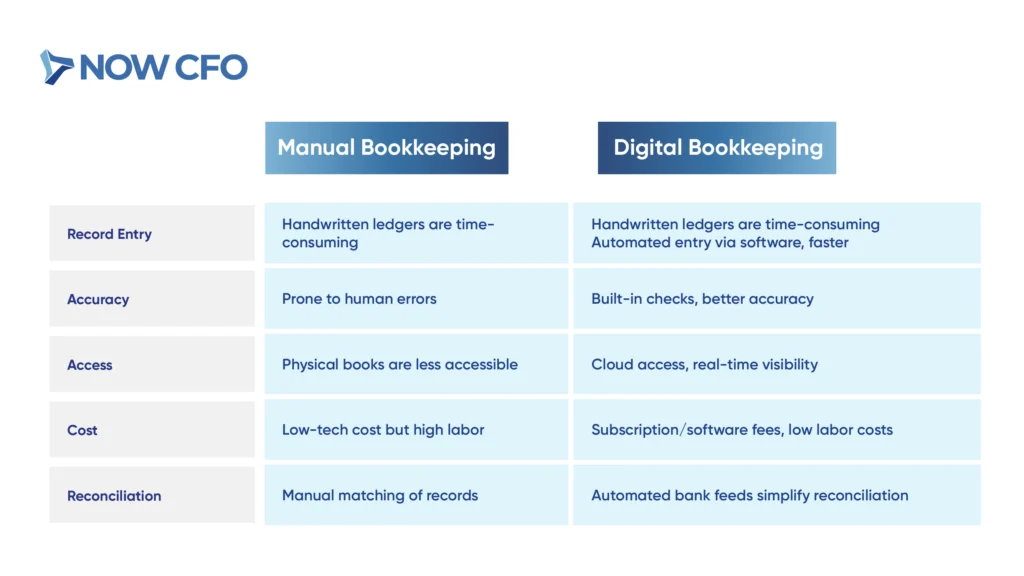
The Role of Double‑Entry in Bookkeeping Accuracy
Double‑entry bookkeeping forms the core of accuracy in a bookkeeping system. Every transaction impacts two accounts: debits and credits, ensuring that the accounting equation (Assets = Liabilities + Equity) stays balanced.
This method reduces errors and improves error detection: if total debits do not match credits, it signals immediately that something is off. Many digital bookkeeping tools use double‑entry logic to ensure accuracy without manual adjustments.
Double-entry formats encourage disciplined tracking and clear audit trails, requiring each entry to balance. This system supports transparency and tax compliance and prevents oversight, even when handling complex transactions like payroll or loans.
Common Bookkeeping Tools and Methods
Effective bookkeeping blends methods and tools to increase accuracy and efficiency.
- Spreadsheets: Low-cost and flexible for basic tracking.
- Cloud-Accounting Software: Automates entries and generates reports.
- Receipt-Scanning Tools: Digitally capture expense documents for easy storage.
- Paper Ledgers or Binders: Useful for low-tech or backup processes.
- Manual Journals + Digital Templates: Hybrid method for transitional workflows.
Preparing to Set Up Your Bookkeeping System
Assessing your business’s specific financial needs and choosing the right tools and support is essential before building your bookkeeping system. This preparation phase lays the groundwork for accurate tracking and long-term success.
Identifying Your Business’s Financial Needs
To structure an effective bookkeeping system, evaluate your business’s specific financial demands. Service-based ventures, retail, or e-commerce operations have clear expense flows, sales volumes, and documentation needs.
Business owners should consider transaction frequency, cash flow complexity, payroll requirements, and regulatory obligations in a detailed assessment phase. Identifying these factors allows your bookkeeping system to align with real burdens.
To emphasize the importance of proper financial clarity, SEOS are nearly twice as likely to report volatile personal income month-to-month compared to non-owners; 41% versus 21%. Identifying your business’s financial needs now helps anchor your bookkeeping system in clarity and preparedness.
Choosing Between DIY and Professional Help
Deciding who to manage your bookkeeping system is a key step affecting accuracy, time investment, and long-term scalability.
| Factor | DIY Bookkeeping | Professional Bookkeeping |
| Cost | Lower upfront, software, and time costs | Higher fee, but saves time and reduces errors |
| Accuracy | Depends on the owner’s skill and discipline | Expert handling reduces misclassification |
| Control | Full control and flexibility | Delegation of tasks, less daily oversight |
| Scalability | Must upgrade tools as you grow | Services adapt to business complexity |
| Compliance Comfort | Risk without accounting knowledge | Professionals ensure regulatory compliance |
Setting Financial Goals for Your System
Setting clear financial goals gives your bookkeeping system purpose. Rather than just tracking numbers, decide what you want to achieve, such as monitoring profit margins or improving reconciliation speed.
Start by identifying measurable targets like increasing revenue, building cash reserves, or making your bookkeeping process more efficient. These goals help shape your chart of accounts, reporting frequency, and automation setup so your financial tracking supports real business outcomes.
Establishing Internal Controls
Implementing internal controls ensures your bookkeeping system remains secure and reliable. Controls protect against fraud, errors, and mismanagement.
Here are key internal control practices to implement:
- Define Clear Financial Roles: Separating responsibilities minimizes the risk of error or fraud by ensuring no one person controls the entire financial process.
- Implement Approval Workflows: Many digital bookkeeping tools allow for automated approval hierarchies and alert setups, boosting accountability and transaction transparency.
- Enforce Regular Reconciliations: Designate someone other than the data-entry person to review and reconcile bank accounts to detect differences or unauthorized activity.
- Schedule Periodic Reviews: Perform monthly or quarterly audits to verify documentation, ensure compliance, and assess the effectiveness of your bookkeeping system tools.
Step-by-Step Process to Set Up a Bookkeeping System
Setting up a structured bookkeeping system ensures every financial transaction is accurately recorded and easy to track.
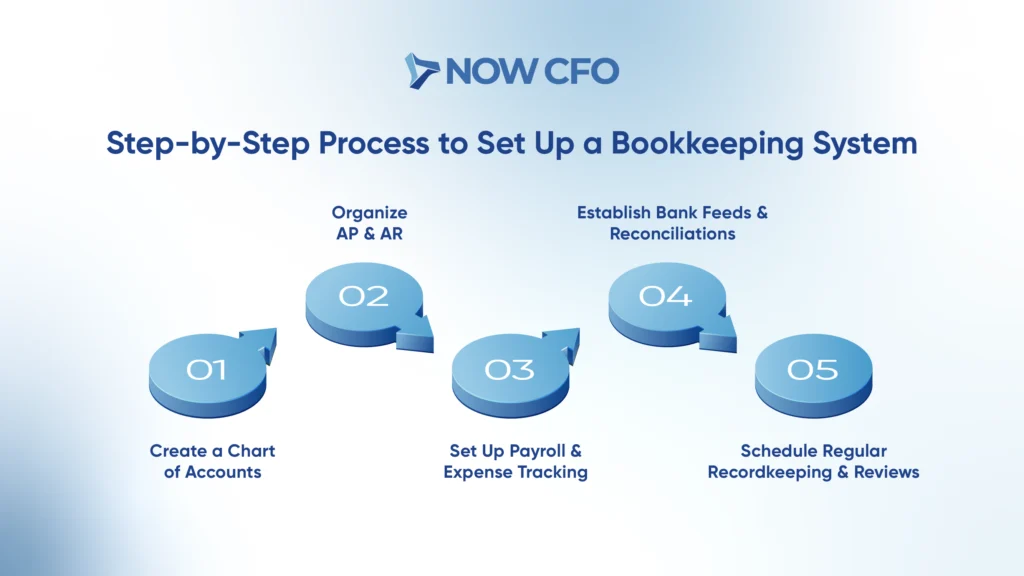
Create a Chart of Accounts
You start your bookkeeping system by creating a chart of accounts, which classifies all accounts: assets, liabilities, equity, income, and expenses. This chart lays a structured foundation for tracking financial activity accurately.
Begin by listing the active accounts your business requires. Include bank accounts, receivables, payables, capital contributions, revenue streams, and expenses. Organize them logically; assets first, then liabilities, equity, income, and costs.
Organize Accounts Payable and Receivable
With the chart of accounts in place, the next step in your bookkeeping system is to organize accounts payable and receivable. Managing obligations and incoming payments clearly separates inflows and outflows for efficient cash management.
- Accounts Payable (AP): Establish a tracking method for vendor invoices, due dates, and payment status. Label each expense using your chart of accounts.
- Accounts Receivable (AR): Set up a system to invoice clients promptly, assign unique invoice numbers, and record customer payments against those invoices. Link each receivable to its revenue account category.
Set Up Payroll and Expense Tracking
Setting up payroll and expense tracking is essential for maintaining accuracy and control within your bookkeeping system.
- Payroll Tracking: Implement a system to record wages, deductions, and employer tax contributions clearly. Retain records as required by law (e.g., employers must keep payroll records for at least three years).
- Expense Tracking: Log all business expenses using organized methods, tagging each with a category from your chart of accounts. Include dates, amounts, vendor names, and purpose.
Establish Bank Feeds and Reconciliations
Next, set up bank feeds and reconciliations to synchronize your financial records with account activity. Connecting your bookkeeping platform or spreadsheet to your bank feeds allows daily or weekly transaction import, reducing manual entry.
Once feeds are active, reconcile your accounts regularly, match imported transactions to entries in your bookkeeping system, and investigate discrepancies. Institutions must compare book and bank balances and analyze differences monthly.
Schedule Regular Recordkeeping and Reviews
Finally, schedule regular recordkeeping and reviews to keep your bookkeeping system accurate and responsive. Consistency builds trust in your financial data and supports proactive decision-making.
Create a routine by recording transactions daily, reconciling accounts weekly, reviewing cash flow, and closing books monthly. Using reminders in your calendar or system helps you stay consistent and build long-term discipline into your bookkeeping process.
During each review period, verify that all transactions are properly categorized according to your chart of accounts. Confirm that AP and AR lists are up to date, reconciliations are complete, and payroll and expense logs reflect actual activity.
Best Practices for Maintaining a Bookkeeping System
Once your bookkeeping system is in place, consistently maintaining it is crucial to ensuring accuracy and efficiency over time. These best practices help keep your financial records organized, compliant, and ready for strategic decision-making.
Keep Receipts and Documentation Organized
Begin by organizing receipts and documentation to help the bookkeeping system and ensure that every expenditure ties back to the record. Store receipts digitally using apps or scan them into a central folder immediately after purchase to reduce evidence loss.
When organizing, categorize documents by type, and ensure each map is assigned to the proper line in your chart of accounts or bookkeeping software. Structured filing supports seamless reconciliation and simplifies audit preparation.
Separate Personal and Business Finances
Maintaining a clear divide between personal and business funds strengthens your bookkeeping system and protects your financial clarity. Mixing personal and business transactions invites errors, complicates tax reporting, and ruins the separation of liabilities.
46% of SMEs use personal credit cards for business expenses, often blurring lines between personal and professional finances. Start by opening a dedicated business bank account and credit card.
Reconcile Bank Statements Monthly
Settling your accounts regularly preserves accuracy and fosters confidence in your bookkeeping system. Conduct monthly bank reconciliations by comparing the bank’s statement with your internal records.
Study every difference, unrecorded deposit, missing fee, or data entry error. Catching these differences quickly keeps cash flow visible and prevents misstatements. Automating reconciliation can further streamline this process and reduce manual error.
Use Automation to Save Time and Reduce Errors
Using automation enhances your bookkeeping system’s efficiency and accuracy. Tools that automate bank feeds, categorization, and receipt capture reduce manual workload and control potential mistakes. 36% of companies already use robotic process automation (RPA) or AI for accounting tasks, and up to 50% of back‑office tasks could be automated soon.
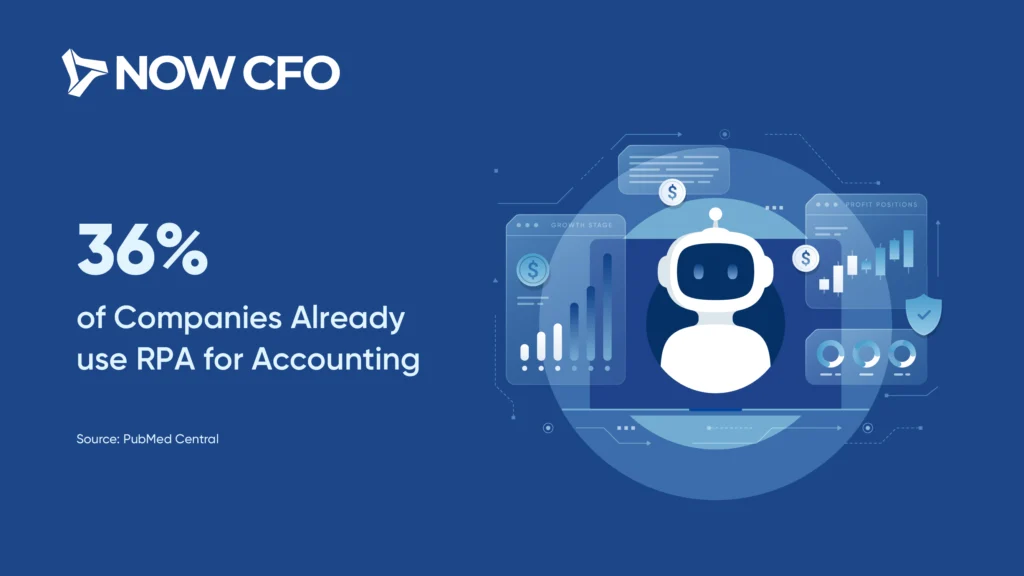
Schedule Periodic Financial Checkups
Scheduling structured financial reviews maintains your bookkeeping system’s relevance and performance. Plan quarterly or semi-annual checkups where you review expense trends, assess profitability, and adjust your chart of accounts or processes as needed.
During these reviews, analyze whether your current setup supports goals like tracking revenue streams, managing cash flow, or supporting credit needs. If your business model has evolved, update expense categories, automation rules, or internal controls accordingly.
Common Mistakes to Avoid in Bookkeeping Setup
To keep your bookkeeping system accurate and reliable, it’s crucial to recognize and avoid common setup missteps.
Misclassifying Transactions in the Chart of Accounts
Misclassifying transactions in your chart of accounts ruins the integrity of your bookkeeping system. For example, assigning a $2,000 equipment purchase to office supplies distorts your expense patterns and compromises tax deductions.
Minor misclassifications add to significant inaccuracies. To avoid this, maintain a clear, well-organized chart of accounts and train your team on proper assignment. Also, review your accounts regularly to catch mislabeling early.
Falling Behind on Daily or Weekly Entries
Consistent transaction recording prevents backlog and maintains financial clarity within your bookkeeping system.
- Daily Entries: This ensures accuracy and avoids lost records. It also provides real-time visibility on cash flow and prevents task accumulation.
- Weekly Review: A Weekly check helps catch misclassified expenses, missing receipts, or duplicate entries quickly.
Overlooking Cash Flow Tracking
Cash flow mismanagement is a top threat to business survival. Your bookkeeping system must closely monitor the timing and movement of cash. Missing this oversight risks shortfalls and impaired operations.
- Track Inflows and Outflows: Log all payments received and outgoing disbursements, aligning them with accounts receivable and payable. Without precise tracking, you lose visibility into liquidity.
- Forecast Cash Needs: Estimate future cash needs based on upcoming expenses and expected income. This foresight gives you time to arrange financing or adjust spending.
- Monitor Free Cash Flow Trends: Identify patterns to anticipate financial stress and avoid surprises.
Not Leveraging Bookkeeping Software Features
Neglecting the advanced features of your bookkeeping software undermines its efficiency and accuracy potential. Many tools offer a wealth of automation and oversight capabilities that go unused.
Automated bank feeds, transaction categorization rules, and recurring entries can save hours and reduce manual errors. Yet, businesses often default to manual entry, missing out on productivity gains.
Beyond automation, features like audit trails, customizable reports, and alerts for anomalies are powerful. Regularly exploring and applying these tools ensures your bookkeeping system operates smoothly, with faster reconciliations and clearer insights.
Skipping Professional Oversight
Managing your bookkeeping system alone without expert oversight raises your risk of misclassified entries, compliance mistakes, and missed financial improvements. Minor errors add up quickly when no bookkeeper reviews your records regularly.
Even limited check-ins from a financial professional, quarterly reviews, or tax preparation bring valuable insights to improve your overall process. Professionals detect issues, refine workflows, and confirm that reconciliations match your financial activity.
Should You Outsource Your Bookkeeping System Setup?
To decide whether to outsource your bookkeeping system setup, you must weigh the professional advantages, costs, timing, and hybrid models.
Benefits of Professional Bookkeeping Setup
Outsourcing your bookkeeping system setup brings specialized benefits that often outweigh DIY efforts:
- Cost Savings: Outsourcing can cut bookkeeping expenses by reducing full-time salaries, training, and benefit costs.
- Access to Expertise: You gain immediate access to skilled accountants who understand tax laws, compliance, and best practices, enhancing accuracy and peace of mind.
- Improved Efficiency & Accuracy: Professional services minimize misclassification, streamline reconciliation, and elevate your bookkeeping system’s reliability.
- Scalability & Flexibility: As your business evolves, outsourced bookkeeping scales up or down seamlessly without the overhead of hiring or training internally.
Costs of DIY vs. Outsourcing Setup
Compare the financial and operational implications of managing setup yourself versus outsourcing it:
| Aspect | DIY Setup | Outsourced Setup |
| Upfront Cost | Low software or manual tools cost; high time cost | Higher fee—but eliminates hiring and training costs |
| Time Investment | The owner spends hours on configuration and learning | Experts set up faster with optimized workflows |
| Accuracy & Compliance | Dependent on your accounting knowledge | Professional oversight improves reliability |
| Scalability & Adaptability | Requires manual updates as business grows | Outsourced services adjust as your needs evolve |
| Access to Expertise & Tech | Limited to own skills and software subscription | Includes advanced tools and experience |
When Outsourcing Makes the Most Sense
Outsourcing your bookkeeping system setup becomes especially prudent when you:
- Limited internal accounting expertise may elevate the risk of misclassification or compliance errors for businesses.
- You value your time and prefer to focus on growth, core operations, or client service rather than learning bookkeeping from scratch.
- Require immediate, reliable access to financial insights, dashboards, or reporting capabilities.
- Need a quick solution that scales as your business evolves.
Hybrid Solutions: DIY + Professional Support
A hybrid approach combines your hands-on involvement with specialist oversight, offering both control and support:
| Component | DIY Role | Professional Role |
| Chart of Accounts Setup | Draft initial structure based on business needs | Review and refine for optimal classification |
| Monthly Reconciliation | Conduct basic reconciliations | Audit results and provide insights |
| Software Configuration | Install and customize bookkeeping software | Optimize settings, automation, and reports |
| Reporting & Analysis | Generate routine reports (profit/loss, cash flow) | Provide advanced analytics, forecasting, and advice |
How NOW CFO Helps Businesses Build Reliable Bookkeeping Systems
At NOW CFO, we tailor bookkeeping solutions that anchor your business with accuracy, clarity, and strategic foresight. We begin by reviewing your current bookkeeping system structure and align it with your chart of accounts, transaction flows, and software environment.
We integrate automation tools and bank feeds to streamline data flows, reduce manual work, and improve real-time visibility into financial health. This approach strengthens efficiency and accuracy, supporting clean reconciliations and simplified monthly closes.
Our professionals also provide ongoing oversight, auditing monthly records, enhancing internal controls, and offering real-time insights. We streamline compliance, prepare you for tax readiness, and offer forecasting support so you make informed decisions with confidence.
Conclusion
Building and maintaining an effective bookkeeping system is much more than tracking numbers. Whether you implement the process yourself or engage experts, the key is consistency and alignment with your goals.
Every organized receipt, reconciled bank statement, and accurate chart of accounts entry reinforces the financial data you rely on to operate and grow. If you’re ready to elevate your bookkeeping with NOW CFO, let’s explore how your business can benefit from streamlined workflows, automated tools, and proactive guidance together.
Frequently Asked Questions
What Information Should I Gather Before Starting a Bookkeeping System?
You’ll need details about your business structure, bank account information, a list of income sources, expense categories, and any existing financial records.
How do I Know Which Bookkeeping Software is Right for my Business?
Choose software based on your business size, transaction volume, integration needs, ease of use, and budget. Look for scalability and support.
Can I Manage Bookkeeping Independently, or Should I Always Hire Help?
You can start solo using simple tools, but as your business grows or your finances become more complex, professional help becomes more valuable.
How Often Should I Update and Review My Bookkeeping Records?
Daily entries and weekly reviews are ideal, with monthly reconciliations and quarterly checkups to keep everything accurate and up to date.
What Happens if I Make a Mistake Setting up My Bookkeeping System?
Mistakes can lead to misreported finances or tax issues. Regular reviews or expert consultations help you catch and fix them early.
Accurate financial tracking forms the backbone of business management, and double-entry bookkeeping delivers just that. Nearly all but the smallest firms rely on double-entry accounting to maintain financial accuracy and drive profit clarity.
Recording each transaction in two accounts, debits and credits, ensures balance and transparency across all records. This record enables business owners to catch errors quickly, precisely monitor cash flow, and make informed financial decisions.
What Is Double-Entry Bookkeeping?
Understanding the basics of double-entry bookkeeping is essential. In this system, every transaction affects the debit and credit accounts.
Definition of Double-Entry Bookkeeping
Double-entry bookkeeping involves every financial transaction impacting at least two accounts. Each entry has a corresponding opposite in this system: one side is debited, and another is credited, making it self-balancing and highly reliable.
Double-entry system accounting reduces errors and supports financial accuracy by immediately flagging imbalances. This structure allows businesses to trace transactions fully, uphold compliance, and produce trustworthy records.
The History and Origins of the Double-Entry System
Stepping from basic bookkeeping methods into the whole structure of the double‑entry system accounting takes us on a journey through time. This dual-entry approach wasn’t invented suddenly; it slowly spread over centuries.
In the late 13th century, between 1299 and 1300, Amatino Manucci, an Italian merchant, recorded his firm’s transactions with both debits and credits in Nîmes, France. That ledger is the earliest surviving example of accurate double‑entry bookkeeping.
While Manucci’s work is the oldest surviving record, the method flourished in Renaissance Italy, especially after the renowned mathematician Luca Pacioli published the first printed book to detail it in 1494, making it far more widely known and used.
How Debits and Credits Work Together
In double‑entry bookkeeping, every transaction affects debit and credit, so the accounting equation remains balanced. For instance, increasing an asset or expense account requires a debit, while raising a liability, equity, or revenue account demands a credit.
This dual-entry mechanism ensures strong internal control and enhances transparency. Also shows the reliability of financial statements within the double‑entry system accounting framework.
Difference Between Single-Entry and Double-Entry Bookkeeping
You need to know the main differences between single-entry and double-entry bookkeeping to see why most businesses rely on the double-entry accounting system.
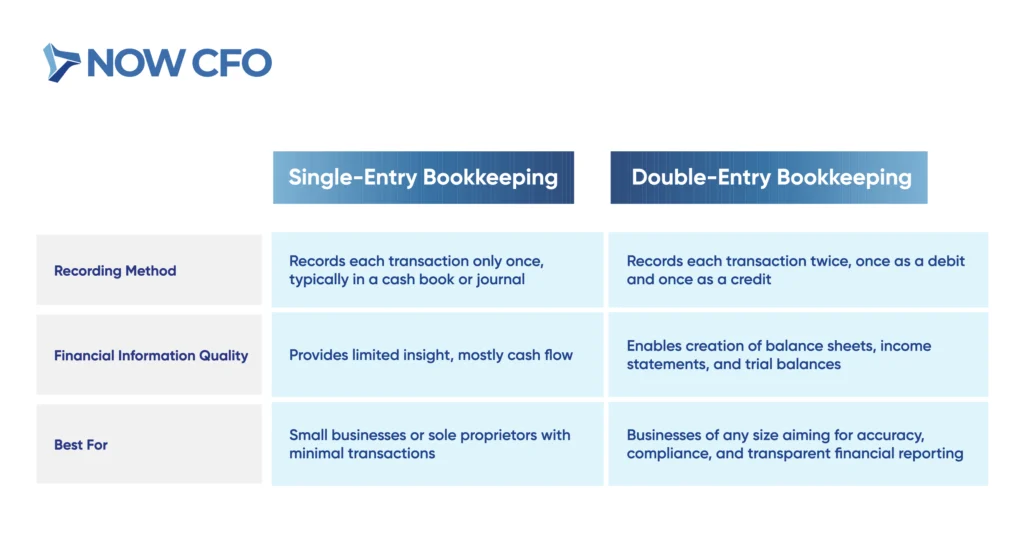
Why Double-Entry Is the Standard in Modern Accounting
Double‑entry bookkeeping earned its status as the standard in modern accounting because it delivers unmatched financial accuracy. Regardless of size, all businesses adopt this method to ensure transparency and accountability.
Most U.S. public companies and many private firms must follow GAAP, which mandates double-entry bookkeeping as the default system. This system supports accrual-basis accounting, giving a full picture of the business.
How Double-Entry Bookkeeping Works
Recognizing how debits and credits work together sets the stage for exploring the mechanics of recording transactions in two accounts.
Recording Transactions in Two Accounts
In double‑entry bookkeeping, you reliably trace where money comes from and where it goes.
- First, each transaction gets recorded in a journal.
- Next, you post those entries to the general ledger.
Suppose you purchase inventory worth $1,500 on credit: debit Inventory (increasing assets) and credit AP (increasing liabilities). The dual posting ensures your accounting records remain precise and trustworthy.
Assets, Liabilities, and Equity Explained
Every transaction is reflected in core financial categories: assets, liabilities, and equity. Assets represent resources a business owns, liabilities denote what it owes, and equity equals what’s left for owners after liabilities.
For instance, when a business takes a loan, assets (cash) increase, and liabilities (loan payable) increase equally. This simultaneous change sustains financial accuracy in accounting, clearly showing where funds originate and how they affect overall ownership.
The Role of the General Ledger
The ledger is structured using the chart of accounts, an indexed setup that categorizes financial entries systematically, enabling clarity and scale.
- The general ledger is the primary repository for all financial transactions, consolidating journal entries and sub‑ledgers into organized accounts like assets, liabilities, equity, revenue, and expenses.
- It is the backbone of key outputs such as the trial balance, balance sheet, income statement, and cash flow reports.
- Each entry includes dates, descriptions, and amounts, making audits straightforward.
Example of a Double-Entry Transaction
Consider this practical scenario illustrating double‑entry bookkeeping in action:
A business pays a monthly rent of $780. The transaction affects two accounts:
- Debit: Rent Expense ($780)
- Credit: Cash ($780)
Each financial move impacts at least two accounts, keeping the books balanced. In ledger entries, the rent payment appears as a debit in the expense account and a corresponding credit in the cash account.
How Double-Entry Leads to Accurate Financial Statements
Every transaction generates equal debits and credits. This automatic balancing ensures that financial accuracy in accounting remains intact. Double‑entry accounting supports the creation of accurate balance sheets, income statements, and trial balances.
Detailed records, including account names, dates, descriptions, and amounts, allow auditors to trace each line item back to its origin. Consistency is maintained throughout periods with every transaction entered via matched debits and credits.
Benefits of Double-Entry Bookkeeping for Businesses
As you understand bookkeeping’s inner workings, it’s vital to recognize why those records matter. Double‑entry bookkeeping structures accuracy and transparency and delivers tangible business advantages.
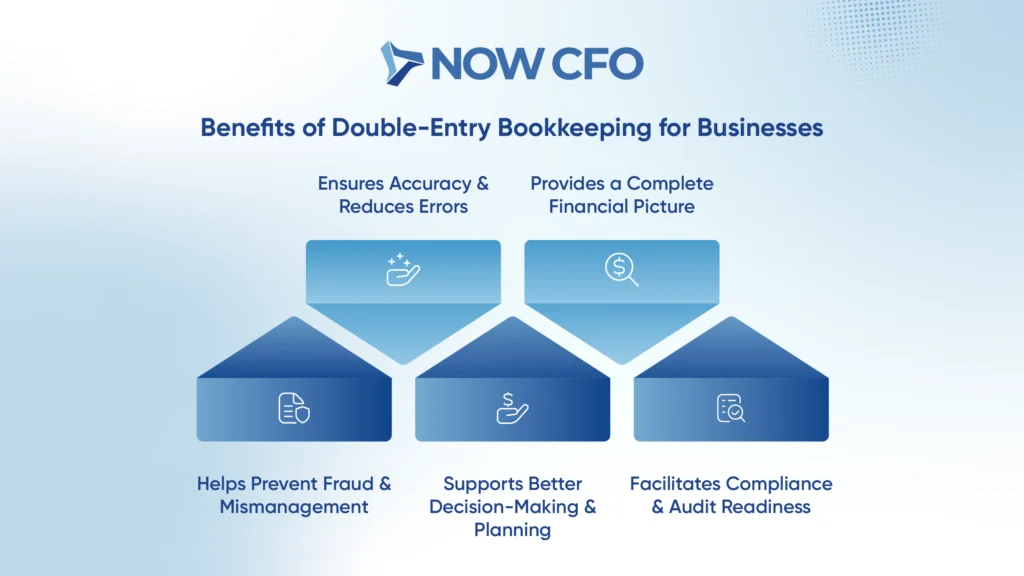
Ensures Accuracy and Reduces Errors
Dual-entry data systems significantly reduce error rates. Also, double-entry systems generate fewer errors than visual checking methods.
Rather than narrowly tracking cash flow, the double‑entry system accounting method accounts for assets, liabilities, equity, inventory, and receivables. Mistakes such as data duplication or omission become detectable via unbalanced trial balances.
Provides a Complete Financial Picture
The significant advantage of double-entry bookkeeping is that it provides a complete financial picture.
- Tracks cash flow, assets, liabilities, equity, inventory, and accounts payable.
- Businesses consistently reflect changes across financial categories, making it possible to produce reliable balance sheets and income statements.
- Robust financial data helps management gain insights into profitability, operational efficiency, liquidity, and long-term value.
Helps Prevent Fraud and Mismanagement
Double‑entry bookkeeping reduces the opportunity for fraud. Because any unauthorized or mismatched entry triggers immediate imbalance, prompting investigation and correction. The dual recording ensures visibility across asset, liability, equity, and expense accounts.
Moreover, every entry includes descriptive dates, accounts, amounts, and narrative. This robust trail makes it far more challenging for fraudulent entries to go unnoticed.
Additionally, accounting software flags unusual patterns, like repeated rounding, unexpected account transfers, or sudden adjustments. These alerts come from double‑entry system accounting logic, which keeps financial statements consistent.
Supports Better Decision-Making and Planning
Organized financial data is essential fuel for smart decision‑making and forward‑looking planning. With a dual-entry transaction, the system delivers clarity on profitability, cash flow, and financial trends.
For example, when revenue entries consistently reflect in both income and equity accounts, management can confidently assess growth margins. Likewise, tracking payables and receivables systematically reveals short‑term liquidity dynamics.
Facilitates Compliance and Audit Readiness
Recording financial transactions as debit and credit requires robust internal controls. This method aligns with GAAP and other accounting standards, providing transparent and organized financial records.
Regulators and auditors expect businesses to present clear, accurate financial documentation. With dual-entry records, differences become instantly visible when trial balances do not align.
Furthermore, GAO’s Financial Audit Manual emphasizes that financial statement audits must comply with professional standards. A solid double‑entry system offers organized and reliable ledger data to underpin these audit phases.
Common Challenges in Double-Entry Bookkeeping
It’s important to acknowledge potential barriers businesses face when adopting double-entry bookkeeping.
Complexity Compared to Single-Entry
Compared to single-entry, double-entry bookkeeping introduces added layers of detail and structure.
- It requires an accurate understanding of debits and credits.
- Demands consistent reconciliations across ledgers.
- Relies on accounting knowledge or professional oversight.
- Greater software or tool dependency for efficiency.
- Higher chance of misclassification without training.
Mistakes in Recording Debits and Credits
Even with a structured framework, errors can easily creep in. Missteps in handling debits and credits are among the most common issues businesses face, often undermining the reliability of double-entry bookkeeping.
- Mixing up debit and credit sides
- Omitting one side of the transaction
- Inputting incorrect amounts
- Misclassifying accounts
- Lack of verification through trial balances
Maintaining an Accurate General Ledger
Maintaining an accurate general ledger is the core of double‑entry bookkeeping. This centralized record aggregates all transaction data, and inaccuracies are visible across financial statements. Without diligent maintenance, businesses risk misstatements, audit discrepancies, and flawed decision-making.
Maintaining ledger accuracy also involves timely posting of entries, consistent ledger maintenance, and regular internal reviews. Untimely or incomplete general ledger updates damage financial oversight and decision-making capability.
Challenges for Small Businesses Without Accounting Expertise
For many entrepreneurs, double-entry bookkeeping can feel overwhelming. These are common issues faced without accounting expertise:
- Difficulty understanding debit and credit rules
- Limited time to maintain accurate records
- Risk of misclassifying expenses and revenues
- Reliance on manual tracking methods
- Trouble reconciling bank and ledger balances
- Limited ability to detect fraud or mismanagement
How Software and Outsourcing Can Help
When bookkeeping feels overwhelming, software and outsourcing can reduce the gap. Modern accounting tools automate debits and credits, reconcile accounts, and generate financial statements with minimal manual intervention.
Real-World Applications of Double-Entry Bookkeeping
The advantage of double-entry bookkeeping is that businesses use it daily to maintain clarity, support compliance, and fuel smarter decisions.
Preparing Financial Statements
Financial statements are among the clearest demonstrations of double-entry bookkeeping in action. The system produces balanced, reliable reports that accurately reflect business performance by ensuring every transaction.
- Double‑entry bookkeeping ensures that both sides of each transaction are recorded.
- Well-prepared financial statements serve as the basis for forecasting trends and planning budgets.
- Banks, investors, and creditors rely on income statements and balance sheets to assess a company’s performance and stability.
- Accurate bookkeeping records are essential to prepare accurate financial statements supporting tax filings and regulatory compliance.
- Helps business owners monitor their company’s performance, identify sales trends, and make informed adjustments.
Supporting Budgeting and Forecasting
Double-entry bookkeeping supplies reliable, categorized financial data by capturing both sides of each transaction. Leaders gain insight into revenue cycles, expense trends, cash flow fluctuations, and performance drivers, enabling them to craft realistic financial projections.
Managing Cash Flow Effectively
Cash flow is often where businesses succeed or stumble, and double-entry bookkeeping provides the transparency needed to stay ahead. 43% of SMOs say cash flow is a problem for their business.
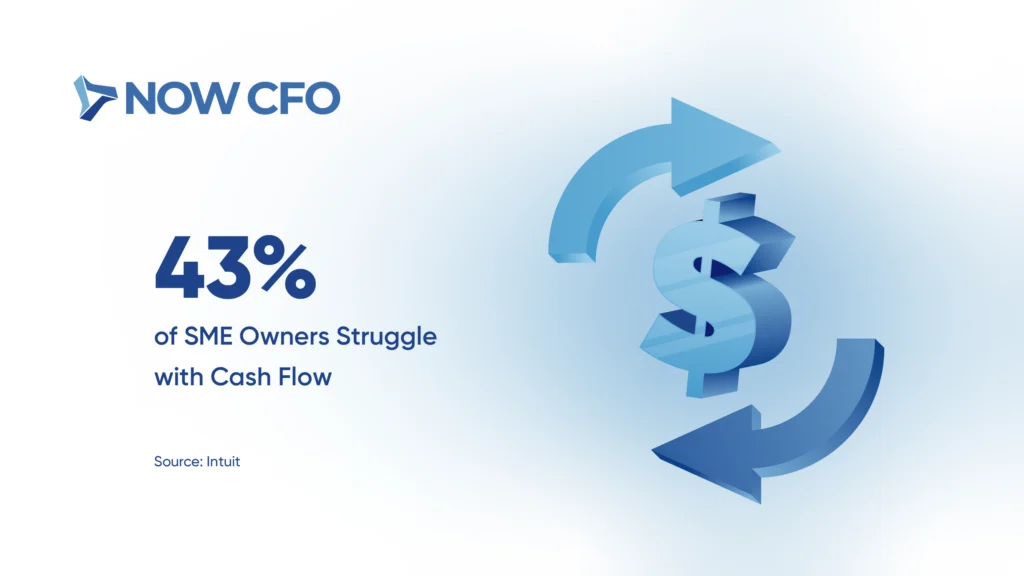
- Clear visibility into cash movements
- Better liquidity planning through forecasting
- Avoiding business failures from poor cash flow
- Enhanced decision-making with cash flow analysis
- Increased resilience and strategic agility
Providing Transparency for Investors and Lenders
Clear, traceable financial records are the cornerstone of transparency investors and lenders demand. Recording transactions with paired debits and credits ensures stakeholders see a balanced view of assets, liabilities, revenues, and equity.
Transparency aids access to capital for small businesses seeking loans. The CFPB rule emphasizes data reporting from lenders on small business credit applications.
Strengthening Long-Term Business Growth
Detailed ledgers enable better forecasting, risk assessment, and access to capital. Accurate record-keeping practices help monitor business progress, support tax filings, and ultimately increase the likelihood of business success.
Businesses maintain detailed, auditable financial histories through the double-entry accounting system. This robust record foundation helps organizations:
- Build credibility with investors and lenders, facilitating debt or equity financing.
- Make agile, evidence-based strategic decisions using performance trends.
- Sustain scalable practices as operations expand and complexity grows.
Should You Manage Double-Entry Bookkeeping In-House or Outsource It?
Every business faces a critical choice between in-house and outsourcing double-entry bookkeeping.
Benefits of Managing Bookkeeping In-House
Managing bookkeeping internally gives businesses a strong sense of ownership over their financial data. Here’s why many organizations keep double-entry bookkeeping in-house.
- Greater Control and Oversight: Business owners maintain direct visibility into every ledger entry, reconciliation, and report.
- Immediate Access to Financial Insights: Provides real-time access to financial data. When decisions surface unexpectedly, you can swiftly retrieve ledgers, analyses, or trial balances.
- Tailored Processes for Businesses: Allows you to customize procedures, the chart of accounts, and workflows to unique business needs.
- Enhanced Confidentiality: Sensitive financial data remains within your organization, reducing distribution risks.
- Team Integration and Accountability: An internal bookkeeper becomes familiar with your culture, operations, and strategic goals.
Limitations of DIY Bookkeeping for Business Owners
However, managing bookkeeping internally isn’t without its challenges. While in-house control offers benefits, the DIY approach can expose businesses to compliance risks, inefficiencies, and costly mistakes, such as:
- Knowledge and confidence gaps
- Time-intensive compliance tasks
- Regulatory and error risk
- High stakes from misentries
- Lack of internal segregation and control
- Scalability limitations
Advantages of Outsourced Bookkeeping Services
For most SMEs, outsourcing provides a balanced alternative. By leveraging professional bookkeeping firms, organizations gain access to expertise, advanced tools, and operational efficiencies that are difficult to replicate internally.
- Outsourcing leverages seasoned professionals, typically CPAs and dedicated bookkeeping teams, who bring deep industry experience in
- Outsourced bookkeeping often costs less than hiring and maintaining full-time staff, while offering flexible service levels tailored to business needs.
- Delegating accounting duties lets owners and managers redirect energy toward core functions, instead of balancing ledgers.
- Professional bookkeepers stay up to date with evolving regulations, tax laws, and audit requirements.
- Many outsourced providers use cloud-based platforms that offer real-time dashboards, automated reconciliations, and seamless integration.
- Outsourcing facilitates segregation between data entry, review, and reporting functions, helping to prevent fraud and mitigate errors.
Cost Considerations for Outsourcing
Cost is one of the most critical factors in deciding whether to outsource double-entry bookkeeping. While outsourcing can bring expertise and scalability, weighing affordability and value against internal hiring is essential. Understanding typical pricing models helps businesses determine whether outsourcing aligns with their financial strategy.
When evaluating outsourced bookkeeping options, your main concerns typically include affordability, predictability, and value. A full-time bookkeeper’s salary is around $50,000 annually, plus benefits, whereas outsourced services can significantly reduce costs.
Conclusion
Double-entry bookkeeping gives your business the structure and transparency it needs for long-term sustainability. Ready to improve your bookkeeping with NOW CFO? Schedule a complimentary strategy session to explore the best solution for your business.
Frequently Asked Questions
What Types of Businesses Benefit Most From Double-Entry Bookkeeping?
Double-entry bookkeeping is helpful for businesses of all sizes. It benefits any company that requires detailed financial reporting or regulatory compliance.
How Does Double-Entry Bookkeeping Improve Financial Decision-Making?
Double-entry bookkeeping records transactions in two accounts, providing a complete picture of assets, liabilities, income, and expenses. This level of accuracy helps owners spot trends, manage cash flow effectively, and plan finance strategically.
Can Double-Entry Bookkeeping Help Detect Fraud?
Double-entry bookkeeping helps detect fraud because every transaction must balance with a debit and a credit, and differences stand out quickly. This creates a natural system of checks and balances to detect anomalies.
What Role Does Technology Play in Simplifying Double-Entry Bookkeeping?
Modern accounting software automates double-entry processes, reducing manual errors and saving time. These tools provide real-time dashboards, integrate with payroll and invoicing systems, and ensure compliance.
When Should a Business Consider Outsourcing Its Bookkeeping?
Outsourcing is practical when bookkeeping demands exceed your internal expertise. Businesses outsource to access professionals’ accuracy, advanced technology, and compliance support.
As your business scales, financial complexity increases, as does the risk of missteps. Knowing the right time to hire CFO services is critical when decisions impact long-term strategy, investor relations, and profitability.
Many SMEs fail due to inadequate financial management. Without CFO-level oversight, companies may miss growth opportunities or face setbacks.
1. You’ve Outgrown Basic Bookkeeping
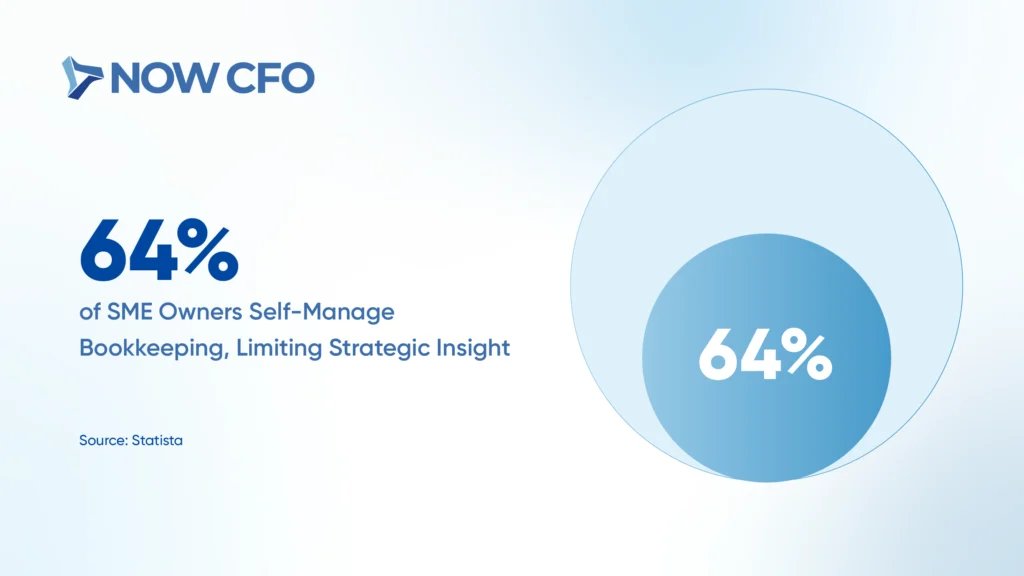
64% of SME owners handle their own bookkeeping rather than using professional accounting services, limiting their ability to gain strategic financial insights. While this approach may reduce short-term costs, it often results in missed opportunities for optimizing cash flow.
Outsourced CFOs provide clarity and strategy, which SEMs often lack. By implementing custom financial dashboards, managing compliance, and delivering actionable forecasts, they transform financial data into a roadmap for growth and expansion.
Source: Statista
2. Cash Flow Issues Keep Resurfacing
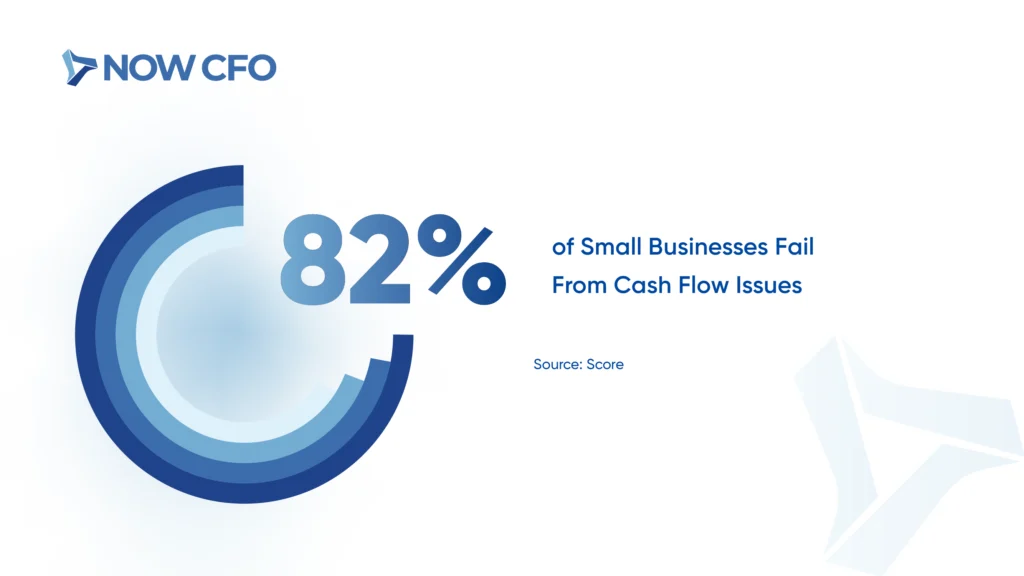
82% of small businesses fail due to poor cash flow management. Cash shortages can disrupt payroll, delay vendor payments, and hinder reinvestment, making even profitable companies vulnerable.
Meanwhile, CFOs address this risk by offering proactive cash flow strategies tailored to business cycles. They also implement real-time reporting tools to manage burn rates and liquidity.
Source: Score
3. Rising Complexity in Financial Reporting
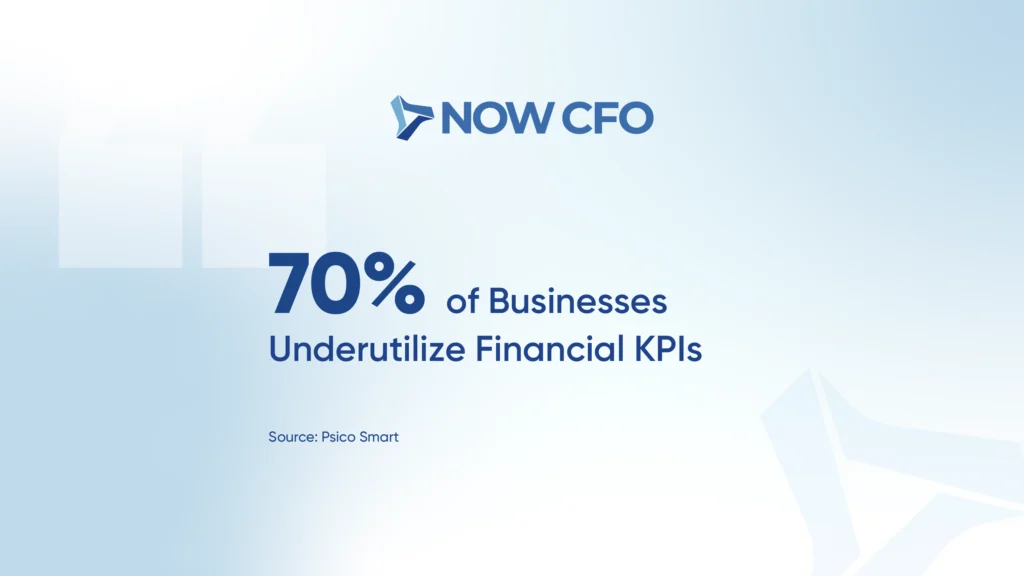
About 51% of U.S. small businesses say regulatory compliance slows their growth. Complex rules, time pressures, and limited resources make accurate financial reporting difficult.
Fractional CFOs provide the expertise to manage compliance more effectively. They ensure reporting is accurate and timely and supports long-term business goals.
Source: U.S. Chamber of Commerce
4. Financial KPIs Are Missing or Misaligned
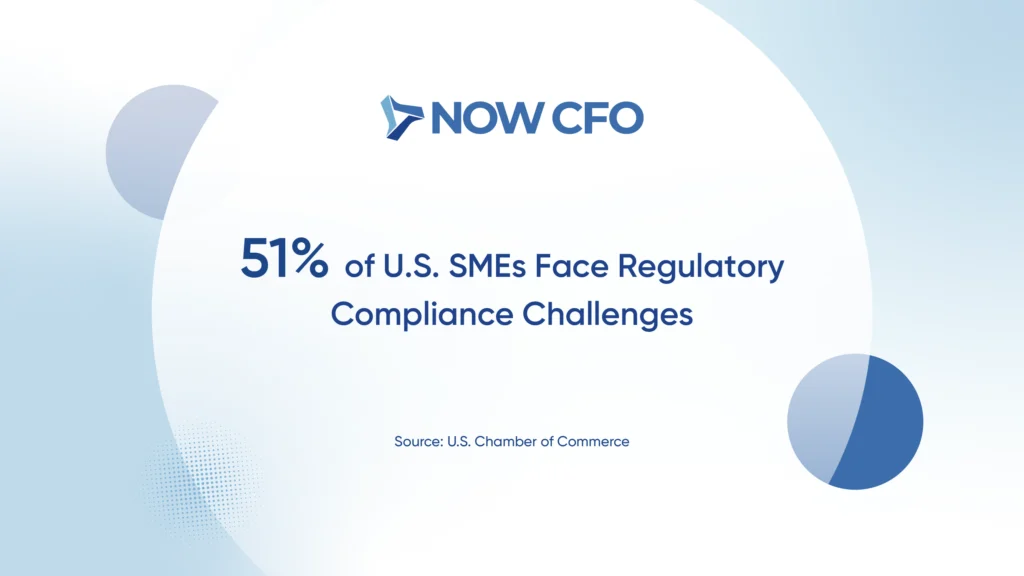
70% of businesses underutilize financial KPIs, missing valuable insights that could align operations with long-term strategy. Without measurable performance indicators, decision-makers often rely on incomplete or outdated data, leading to misaligned goals.
CFOS develops customized KPI frameworks tailored to business objectives to close this gap. Through ongoing monitoring and financial analysis, they help leaders track what matters most, improving clarity and accountability.
Source: Psico Smart
5. You’re Over-Leveraged or Considering New Debt

70% of small employer firms carry outstanding debt, often using credit to cover operational gaps or fund growth. Without structured repayment plans and financial oversight, this reliance on debt can strain cash flow and limit future financing.
Businesses manage debt strategically with the help of outsourced CFOs, balancing short-term needs with long-term financial health. From optimizing loan structures to forecasting repayment impacts, they provide clarity and control over liabilities.
Source: Small Business Administration
6. You Need a Long-Term Strategic Plan
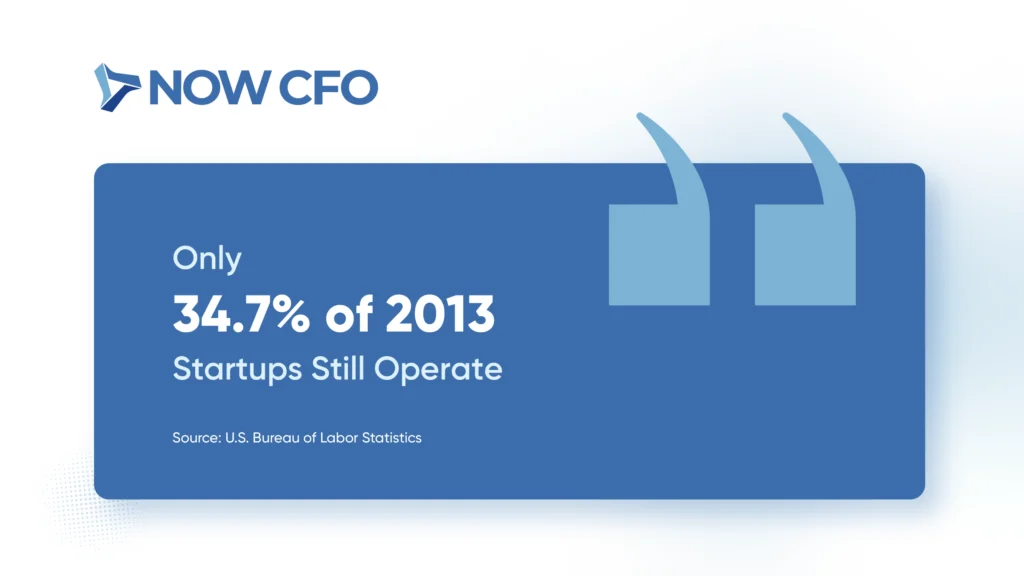
Only 34.7% of businesses launched in 2013 are still operating. Economic fluctuations, poor financial planning, and a lack of strategic direction are common reasons many companies fail to sustain growth over time.
However, fractional CFOs offer the financial leadership needed to beat the odds. They build strong financial models, analyze market shifts, and guide investment decisions.
Source: U.S. Bureau of Labor Statistics
Conclusion
From unresolved cash flow issues to rising compliance demands, missing the right moment to level up financial leadership can limit your company’s growth potential. Recognizing the time to hire CFO services early empowers you to avoid financial missteps.
If your business approaches this turning point, explore what’s next with a free consultation at NOW CFO. Evaluate your strategic goals and operational needs. Whatever path you choose, NOW CFO supports your next growth phase.
Effective bookkeeping is a cornerstone of financial clarity and growth for small businesses. Yet, many SMOs face instability, over 20% points more likely than non-owners to experience income drops, income volatility, or unexpected financial stress.
Organized financial records reveal key trends in cash flow, pinpointing expense patterns and smoothing out seasonal fluctuations. From categorizing expenses to reconciling accounts, bookkeeping supports more precise forecasting, strengthens compliance, and boosts readiness for audits.
What is Bookkeeping and Why is it Important?
Accurate financial tracking establishes a transparent foundation for your business decisions. The definition of bookkeeping clarifies this essential function in the section that follows.
Definition of Bookkeeping
Bookkeeping systematically records financial activities, including sales, purchases, expenses, receipts, and payments, in ledgers or accounting systems. SME bookkeeping provides a clear view of transactions, enabling owners to track cash inflows and outflows.
Maintaining organized financial records helps owners gain clarity into their cash flow management. Breaking entries into AR/AP and the general ledger supports financial reporting and informed decision-making.
The Purpose of Bookkeeping in Business
A clear understanding of bookkeeping’s purpose in business builds on the foundational definition and reveals why organized financial records matter.
- Financial Statements: These reports support informed leadership and effective financial management.
- Track Income Sources and Expenses: Logging revenue and costs ensures cash flow and profitability clarity. Organized entries help identify redundant expenditures and optimize resource allocation.
- Support Tax Filing and Compliance: Precise records simplify the preparation of tax returns and substantiation of deductions.
Difference Between Bookkeeping and Accounting
Understanding the distinct roles of bookkeeping and accounting helps businesses allocate responsibilities effectively and build a stronger financial infrastructure.
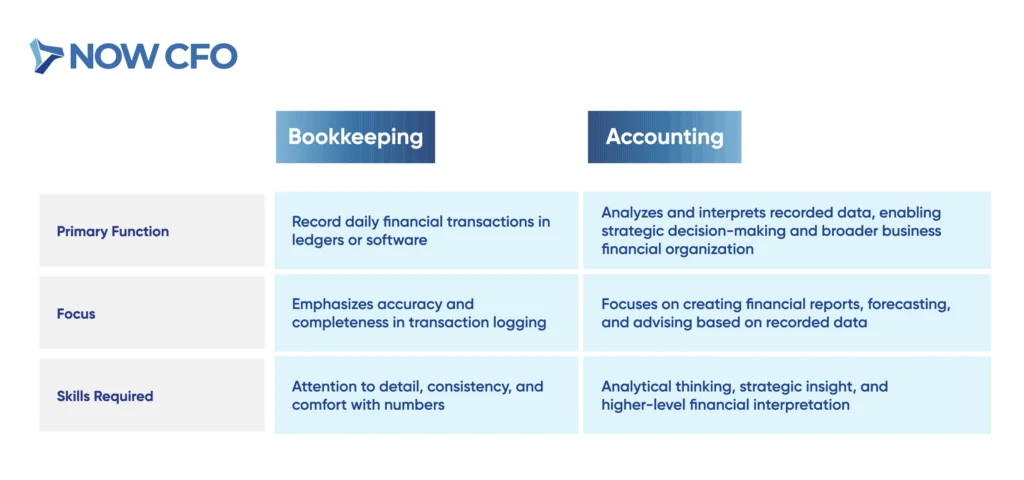
Why Accurate Records Drive Better Decisions
Maintaining precise financial records empowers business leaders to assess performance and confidently forecast future trends. Organized bookkeeping basics ensure reliable data, enabling real-time cash flow and profitability analysis.
Firms that maintain detailed financial records are likely to secure external funding, highlighting the critical role of accuracy. Moreover, SMEs document their finances and regularly review statements to improve decision-making.
Compliance and Tax Benefits of Proper Bookkeeping
Accurate and consistent bookkeeping helps businesses report taxable income and claim eligible deductions. It also keeps them audit-ready, supporting a stronger overall business financial organization. Proper bookkeeping basics preserve documentation required for tax filings, ensure compliance, and support an accurate financial strategy.
The Basics of Bookkeeping
Bookkeeping serves as the essential framework for tracking a business’s financial health. Every financial movement, from sales and purchases to expenses and payroll, must be accurately recorded and organized to maintain a clear financial picture.
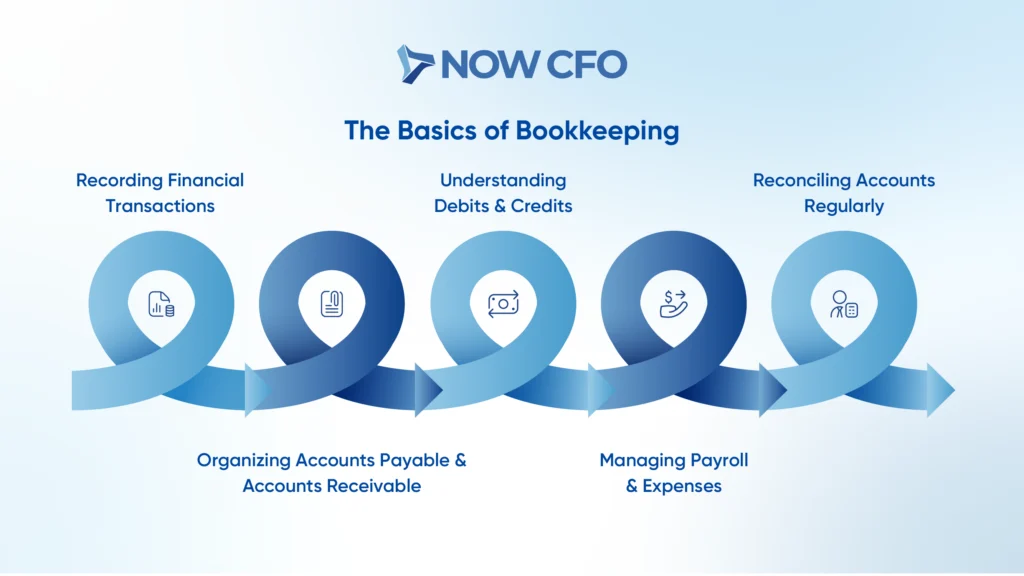
Recording Financial Transactions
Each transaction clearly supports bookkeeping basics, business financial organization, and efficiency as operations scale.
- Logging each sale, expense, and payment into ledgers or digital tools ensures accurate bookkeeping.
- Assigning every entry to its correct account, such as accounts payable or general ledger, enhances clarity in small business bookkeeping.
- Structured documentation like invoices, receipts, and bank statements supports transaction validation and smooth audits.
Organizing Accounts Payable and Accounts Receivable
Organizing AR/AP ensures businesses maintain liquidity and strengthen vendor and client relationships. Precise tracking of incoming invoices and outgoing payments enhances SME bookkeeping and business financial organization.
Companies that manage these flows efficiently reduce late fees and prevent cash flow gaps. Clear labeling and timely entries support accurate bookkeeping and streamline financial operations.
Understanding Debits and Credits
Every financial transaction follows the double-entry principle, with at least one debit and one credit, ensuring books stay balanced and reliable. Debits increase asset and expense accounts, while credits boost liability, equity, and revenue accounts.
Accurately applying these movements keeps the general ledger accurate and supports organized bookkeeping basics. Double‑entry bookkeeping ensures total debits match total credits, maintaining accuracy and detecting potential fraud or misrecorded data.
Managing Payroll and Expenses
Managing payroll and expenses is vital for bookkeeping. It ensures financial outflows remain accurate and sustainable. Processing payroll involves wage payments and employer-paid taxes, benefits, and insurance.
SME bookkeeping benefits from precise expense categorization, distinguishing between payroll, benefits, and operating costs, which supports business financial organization. Employers experience total compensation costs that extend beyond salaries.
Reconciling Accounts Regularly
Reconciling accounts compares bank statements with bookkeeping records monthly to ensure consistency and catch differences. Regular reconciliation detects fraud, bank errors, or missing transactions and supports reliable bookkeeping.
Performing monthly reconciliations aligns with recommended internal controls and maintains organizational trust. Most businesses reconcile monthly, while higher‑risk or higher‑volume operations may reconcile more frequently.
Bookkeeping Systems and Methods
Bookkeeping systems and methods define how businesses document, process, and manage their financial data. Selecting the right structure strengthens the business’s overall financial organization and supports long-term financial clarity.
Single-Entry vs. Double-Entry Bookkeeping
Each system has distinct advantages based on the complexity and scale of operations. While single-entry may suffice for micro-businesses, double-entry offers greater control and accountability.
| Aspect | Single‑Entry Bookkeeping | Double‑Entry Bookkeeping |
| Entry Style | Records each transaction once, typically in a simple cash book | Records each transaction twice, once as a debit and once as a credit |
| Simplicity vs. Accuracy | Easy to apply with basic tracking of income and expenses | More complex but supports comprehensive ledgers, reconciliation, and precise financial tracking |
| Use Case Suitability | Works for one-person operations or sole proprietors | Suits growing businesses that require reliable bookkeeping basics and accurate business financial organization |
Manual vs. Digital Bookkeeping Systems
While manual methods offer simplicity and low upfront costs, they can hinder growth and increase errors.
| Aspect | Manual Bookkeeping | Digital Bookkeeping |
| Process | Records transactions by hand in journals and ledgers | Captures entries instantly via software, eliminates posting delays, and maintains accurate financial records in real time |
| Data Accuracy & Errors | Prone to human error and delays | Automates calculations and reduces mistakes |
| Cost & Training | It has a low upfront cost and minimal training | Requires investment and onboarding, but yields long-term productivity gains and financial clarity |
Popular Bookkeeping Tools and Software
Choosing the right tools elevates your bookkeeping from routine recordkeeping to powerful financial management. Around 64.4% of American SME use software to simplify their bookkeeping, indicating widespread adoption of digital solutions.
- QuickBooks Online
- Xero
- Zoho Books
- FreshBooks
- Wave Accounting
- Microsoft Dynamics 365 Business Central
- GnuCash
- Bench
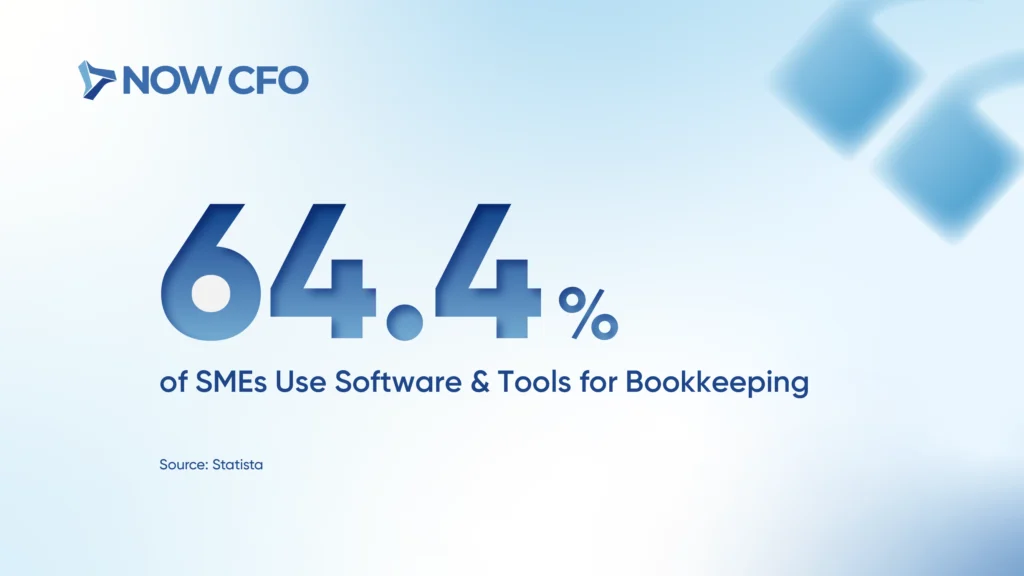
Setting Up a Chart of Accounts
Setting up a chart of accounts establishes a structured framework for organizing transactions into categories like assets, liabilities, equity, income, and expenses. It supports bookkeeping by ensuring consistent classification, simplifying reporting, and strengthening business financial organization.
Keeping track of your finances with organized accounts is key to running your business smoothly and filing taxes correctly. Most small businesses need bookkeeping basics to stay on top of their money and avoid mistakes.
Choosing the Right System for Your Business
Selecting the correct bookkeeping method equips your business to grow with financial clarity and control. Simpler operations may adopt basic bookkeeping methods, while scaling businesses benefit from systems that support detailed financial records.
- Tools often deliver higher business financial organization, reducing errors and accelerating workflows.
- Digital platforms may require upfront investment and time commitment, but offer better long-term bookkeeping stability.
Best Practices for Staying Financially Organized
Maintaining financial clarity depends on implementing best practices that enhance daily and long-term management. SMOs benefit from structured processes that support bookkeeping accuracy, reduce tax-season stress, and enable timely strategic decisions.
Adopting foundational habits, such as tracking receipts and conducting monthly reconciliations, strengthens business financial organization and promotes operational efficiency.
Keeping Receipts and Supporting Documentation
Maintaining receipts, invoices, canceled checks, and supporting documents supports deduction claims, expense validation, and audit-readiness. Organizing documentation in physical or digital form strengthens financial records management.
Taxpayers meet their burden of proof by retaining documentation, such as receipts, to substantiate expenses, especially travel, entertainment, gifts, and auto costs. Careful recordkeeping supports bookkeeping, compliance, and clarity in financial tracking.
Reconciling Bank Statements Monthly
Reconciling business bank statements monthly tightens the link between your ledger and actual cash flow. Regular reconciliation helps promptly identify bank fees, missed deposits, and unauthorized charges, maintaining trust in your financial records.
Separating Business and Personal Finances
Maintaining separate accounts and records for personal and business expenses ensures that financial records remain clean and audit-ready. Opening a dedicated business checking account and obtaining a business credit profile to separate finances formally mitigates legal risk.
Scheduling Regular Bookkeeping Check-Ins
Establishing weekly or monthly bookkeeping check-ins for reviewing ledgers, invoices, and expense logs maintains financial record accuracy. Frequent check‑ins prevent backlog, eliminate errors, and reinforce business financial organization.
Routine financial reviews are part of ongoing management to ensure budgets stay on track and discrepancies are caught early. Reviewing transactions, balances, and pending entries strengthens bookkeeping and supports timely decision‑making.
Leveraging Technology for Efficiency
Modern bookkeeping solutions automate invoicing, categorize expenses, and sync directly with bank feeds. Electronic documentation reduces manual errors and ensures audit-ready financial records.
SMEs also use software to automate recordkeeping and financial tasks, demonstrating widespread reliance on digital systems.
Common Bookkeeping Mistakes to Avoid
Maintaining financial discipline provides stability and clarity for your bookkeeping. After organizing documentation and separating finances, recognizing mistakes prevents confusion, keeps financial records accurate, and supports business financial organization.
Mixing Personal and Business Transactions
Mixing personal and business transactions creates murky records that undermine bookkeeping basics and distort financial clarity for business decision-making. Using an individual card for business expenses or vice versa jeopardizes the integrity of your financial records.
Commingling makes cash flow tracking unreliable and risks legal and tax complications. Blending personal and business finances may expose personal assets to liability by weakening entity separation for LLCs or corporations.
Falling Behind on Recordkeeping
Maintaining accurate financial practices ensures your bookkeeping remains reliable and supports long‑term success.
A QuickBooks survey reveals that approximately 42% of SME owners lack confidence in their accounting knowledge, increasing the likelihood of falling behind and making mistakes. Delays in tracking too frequently result in rushing through entries, leading to misclassifications, missed deductions, and inaccurate profit calculations.
Misclassifying Expenses or Income
Misclassifying expenses or income derails bookkeeping basics by distorting P&L statements, compromising financial records, and misleading decision-making. Assigning personal or capital costs as business expenses or mislabeling revenue inflates profitability or underreports taxable income.
Inaccurate classification often triggers audit risks and tax issues. The IRS warns that misclassification can result in penalties and heightened scrutiny, especially when expense categories don’t align with documented business activity. Proper categorization supports accurate deductions, prevents misstatements, and sustains business financial organization.
Ignoring Cash Flow Tracking
Neglecting cash flow monitoring erodes trust in financial operations and disrupts bookkeeping reliability. Reviewing the hazards reveals how vital oversight is to sustainable financial records and sound business financial organization.
- Creates operational blind spots
- Prevalent among small businesses
- Threatens stability and sustainability
- Complicates budgeting and profit analysis
Skipping Professional Help When Needed
Neglecting to seek professional assistance can expose your bookkeeping to avoidable errors, compliance issues, or strategic blind spots. Although hiring external support adds cost, the investment can dramatically improve the quality of your financial records and bolster your business’s financial organization.
Many small business owners rely on paid professionals for critical tasks like record keeping, tax planning, and return preparation, underscoring that professional help often substitutes for time-consuming internal work. Engaging a knowledgeable professional ensures accurate categorization, timely tax filing, and meaningful financial insights.
Should You Handle Bookkeeping Yourself or Outsource It?
Choosing between DIY bookkeeping and outsourcing affects your business’s financial clarity and operational efficiency.
Pros and Cons of DIY Bookkeeping
DIY bookkeeping offers control but often at a cost.
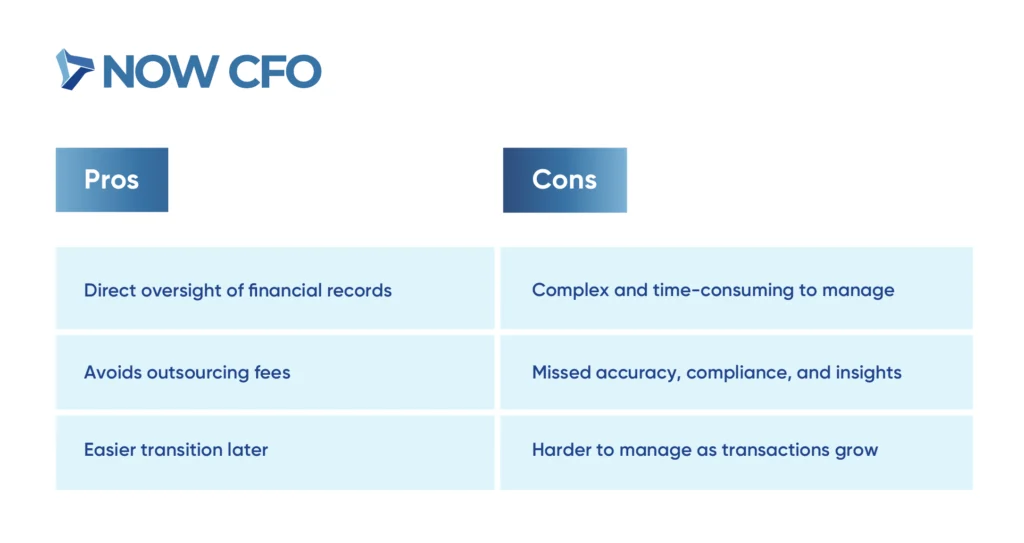
When to Hire a Professional Bookkeeper
Evaluating whether to handle bookkeeping in-house or outsource it guides how effectively your business manages it accurately and efficiently.
- Overwhelmed by Administrative Work: When financial tasks consume more time than core activities, outsourcing preserves focus and supports better business financial organization.
- Consistent Backlog or Late Reporting: Professional support ensures financial records stay updated and audit-ready if records remain behind schedule or reconciliation lags.
- Starting to Feel Compliance Strain: Hiring a bookkeeper becomes essential when compliance and tax deadlines approach.
- Scaling Business and Volume Growth: As transaction volume grows, managing bookkeeping manually can strain operations; professionals offer scalable accuracy.
- Avoiding Costly Year-End Cleanups: Regular bookkeeping by a professional prevents year-end rushes and expensive cleanup.
Benefits of Outsourced Bookkeeping Services
Determining whether to manage bookkeeping internally or outsource it significantly impacts your bookkeeping quality and operational efficiency.
- Cost savings on staffing and overhead
- Access to specialized expertise and accuracy
- Flexibility and scalability
- Improved time efficiency
- Enhanced fraud prevention and compliance
Cost Considerations for Small Businesses
Cost structures vary significantly between in-house and outsourced models. Hiring a full-time bookkeeper, including salary, benefits, and overhead, costs around $50,000 annually.
Outsourced services present a more affordable alternative, depending on service depth and complexity (pay-as-you-go model). Flexible pricing models also exist, offering clarity for volume-based businesses.
How NOW CFO Supports Bookkeeping for Growth
NOW CFO delivers professional bookkeeping services tailored for businesses poised to grow. We offer accurate, reliable, and scalable solutions that elevate bookkeeping basics. Our approach includes double-entry bookkeeping, consistent bank reconciliations, and thorough financial statement preparation, ensuring clarity and compliance.
We offer scalable models that adapt as operations expand, aligning with shifting needs and transaction volumes. Strategic cleanup offerings restore accuracy to financial records, especially when irregularities or outdated data hinder decision-making.
Conclusion
Strong bookkeeping serves as a record-keeping exercise and a growth enabler. By implementing the practices described, business owners gain clarity, retain compliance, and support expansion. Whether you manage bookkeeping internally or engage experts, maintaining organized financial records keeps your business agile and transparent.
Ready to level up your financial infrastructure with NOW CFO? Our team can tailor a plan that aligns with your growth stage and simplifies decision-making. Let your financial data become your growth roadmap.
Frequently Asked Questions
What’s the Difference Between Bookkeeping and Accounting in Small Businesses?
Bookkeeping focuses on recording financial transactions, while accounting interprets that data to produce reports, make forecasts, and support strategic decisions.
How Often Should a Business Reconcile Its Accounts or Bank Statements?
Monthly reconciliation is ideal. It ensures your bookkeeping records match actual bank activity and helps detect errors or fraud early.
Do Small Businesses Need to Use Double-Entry Bookkeeping?
It depends on business complexity. Single-entry may work for sole proprietors, but double-entry offers better financial organization and error tracking.
Are there Affordable Digital Tools for managing SME Finances?
Yes, many tools, such as Wave, Zoho Books, and QuickBooks Online, offer scalable features and low-cost plans for basic bookkeeping needs.
Why is Separating Business and Personal Finances Important?
Blending accounts can create tax issues and financial confusion. Separation supports cleaner bookkeeping and improves audit readiness.
Understanding the difference between bookkeeping and accounting is vital for financial clarity and business growth. Bookkeeping ensures the disciplined capture of every transaction, while accounting transforms that data into strategic insight.
Many SME owners find themselves overwhelmed by financial terminology, with 60% reporting low confidence in their accounting knowledge. Through precise record-keeping, SMEs gain reliable financial records, clean ledgers, and accurate financial statements.
What Is Bookkeeping?
Bookkeeping is the structured process of recording a business’s financial transactions, including sales, purchases, receipts, and payments. It organizes this data in a general ledger for easy tracking and reporting, forming the foundation for accurate accounting.
Definition of Bookkeeping
Bookkeeping records every financial transaction, profit, expense, invoice, and receipt in journals or digital ledgers. This consistent tracking of financial records ensures clarity in the general ledger.
Many U.S. businesses are SME, emphasizing how nearly every enterprise relies on precise bookkeeping for basic operation and tax compliance. Additionally, about 38% of SMEs use specialized software to automate recordkeeping, enhancing accuracy and efficiency.
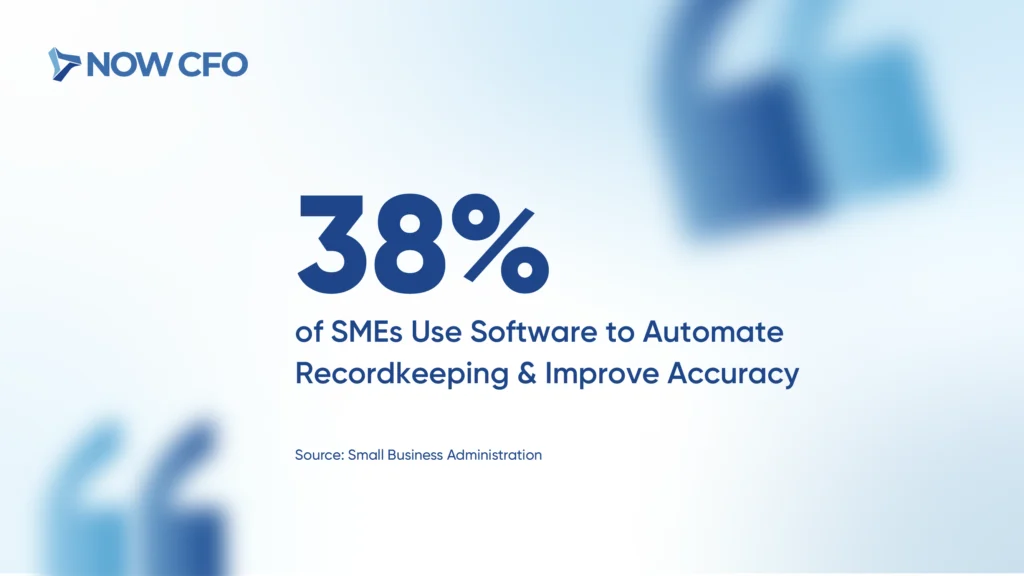
Core Bookkeeping Tasks (Recording Transactions, Managing Ledgers)
By accurately recording transactions into journals or software. Consistent transaction entry supports reliable financial statements, strengthening overall accounting integrity. Many SMEs use some form of digital bookkeeping, highlighting that most rely on technology rather than manual methods.
The Role of Debits, Credits, and Double-Entry
Accurate bookkeeping depends on structured processes:
- Debits: Increase asset or expense accounts, decrease liability or equity accounts. That precise categorization supports organized financial records and enhances general ledger reliability.
- Credits: Increase liability or equity accounts, decrease asset or expense accounts. That balance ensures each transaction reflects both sides of an exchange.
- Double-Entry: Every transaction records both debit and credit entries to maintain equilibrium. The IRS system follows this method rigidly, assigning unique journal numbers for cross-referencing and error reversal (irs.gov).
Tools and Software Commonly Used by Bookkeepers
Reliable tools support daily bookkeeping operations, supporting data integrity before accountants begin their strategic evaluations.
- QuickBooks and Peachtree
- Electronic Accounting Software
- Cloud-Based Platforms
- Spreadsheet Programs (Excel, Google Sheets)
- Bank Integration Tools
Why Bookkeeping Is Essential for Small Businesses
SMEs rely on precise bookkeeping to maintain financial clarity and reliable reporting. Recording transactions accurately drives financial records.
Moreover, accurate ledgers improve tax preparation accuracy, reduce audit risks, and support better budgeting and forecasting. Solid bookkeeping also directly impacts small business survival.
What is Accounting?
Accounting summarizes, analyzes, and interprets financial data to support business decision-making and ensure regulatory compliance. It transforms raw financial records into meaningful insights through financial statements, budgeting, and forecasting.
Definition of Accounting
Accountants create financial statements, such as balance sheets, P&L, and cash flows, to inform decision-makers, regulators, and potential investors. Strong bookkeeping supports the accounting process by feeding accurate data into strategic analysis.
Additionally, accounting supports business operations by enabling adequate budgeting, forecasting, and timely tax preparation. By transforming data into actionable insights, accounting helps bookkeeping ensure organized inputs and maximizes strategic value.
Core Accounting Functions (Analysis, Reporting, Compliance)
Clarity from bookkeeping evolves into a meaningful strategy through accounting.
- Analysis: Evaluates financial data to support budgeting and forecasting, assess performance, and inform decisions.
- Reporting: Compiles data into financial statements, balance sheets, P&L, and cash flow, ensuring transparency for stakeholders and regulators.
- Compliance: Follows tax laws and financial regulations. Accurate tax preparation relies on structured reporting and audit-ready documentation to avoid penalties.
The Role of Accountants in Financial Strategy
Precise bookkeeping provides essential inputs, and accounting shapes those inputs into a strategic direction.
- Accountants guide business growth by crafting budgets, forecasts, and long-term financial plans that steer decisions.
- Analysts use historical data to model future outcomes, enabling smarter allocation of resources and better budgeting.
- Accountants often lead the planning of yearly budgets, explain how the business is doing financially to company leaders, and help guide financial decisions.
Accounting Deliverables: Balance Sheets, P&L, Cash Flow Statements
Accurate bookkeeping lays the groundwork for meaningful strategy.
- Balance Sheets: Offer a snapshot of assets, liabilities, and equity at a specific moment. Small businesses use them to assess financial health and make strategic comparisons.
- Profit & Loss (P&L) Statements: These reports detail revenue, expenses, and net income over a period. They support budgeting and forecasting by pinpointing profit trends and operational efficiency.
- Cash Flow Statements: Track cash inflows and outflows from operations, investments, and financing. This is critical for managing liquidity and making informed financial decisions.
Why Accounting Goes Beyond Record-Keeping
Accounting ensures financial statements reflect actual business performance. Relying on precise bookkeeping as input, accountants derive insights from organized data to guide decision-making.
SMEs often engage professionals for strategy and tax compliance; record-keeping time burdens account for significant portions of the workload. This makes having an accounting expert a necessity and a time-saving solution.
Key Differences Between Bookkeeping and Accounting
Precision in bookkeeping supplies the accurate data that accountants transform into strategic value.
Key Differences Between Bookkeeping & Accounting
- Day-to-Day Tasks vs. Strategic Oversight
- Data Entry vs. Data Analysis
- Historical Records vs. Forward-Looking Planning
- Compliance Support vs. Strategic Guidance
- Skill Sets and Qualifications Compared
Day-to-Day Tasks vs. Strategic Oversight
Understanding how daily financial activities differ from long-term planning helps clarify the roles of bookkeeping and accounting in business operations.
| Daily Transaction Tasks | Strategic Financial Oversight |
| Recording every sale, payment, and expense into the ledger | Analyzing ledger data to guide budgeting and forecasting, business planning, and performance evaluation |
| Handling AR/AP, invoicing, and reconciliation | Communicating financial health via reports to stakeholders, aligning with long-term growth strategies |
Data Entry vs. Data Analysis
Reliable and accurate bookkeeping enables accountants to apply strategy and insight.

Historical Records vs. Forward-Looking Planning
Differentiating between tracking past transactions and planning shows the distinct focus areas of bookkeeping and accounting functions.
| Historical Records (Bookkeeping) | Forward‑Looking Planning (Accounting) |
| Maintains precise records of past transactions, assets, liabilities, revenue, expenses, and invoice history | Uses recorded data to create budgets, budgeting, and forecasting |
| Ensures the accuracy of financial statements and audit readiness | Applies trend analysis and projections to inform growth strategy and resource allocation |
Compliance Support vs. Strategic Guidance
Accounting goes far beyond record-keeping. It ensures compliance support, meets legal and tax requirements, and safeguards business integrity. Active compliance reduces the risk of penalties and instills confidence with regulators.
At the same time, accounting delivers strategic guidance, plans budgets, forecasts cash flow, and advises on growth decisions. It uses accurate bookkeeping data to shape financial strategy and enable informed action.
Skill Sets and Qualifications Compared
Accounting goes far beyond record-keeping. It ensures compliance support, meets legal and tax requirements, and safeguards business integrity. Active compliance reduces the risk of penalties and instills confidence with regulators.
At the same time, accounting delivers strategic guidance, plans budgets, forecasts cash flow, and advises on growth decisions. It uses accurate bookkeeping data to shape financial strategy and enable informed action.
How Bookkeeping and Accounting Work Together
Bookkeeping and accounting are interconnected functions. Accurate data entry forms the foundation for an insightful financial strategy. The difference between bookkeeping and accounting lies in their roles.
Bookkeeping as the Foundation for Accounting
Accurate bookkeeping establishes organized ledgers and up-to-date financial records.
Clear record maintenance supports:
- Timely and accurate reporting
- Responsible tax preparation and compliance
- Effective budgeting and forecasting
Moreover, SME owners spend substantial time organizing and entering tax-related receipts, highlighting how foundational bookkeeping drives subsequent accounting efficiency.
Ensuring Accurate Financial Reporting
Accurate financial reporting depends on careful bookkeeping practices that feed reliable data into the accounting process.
- Consistent Ledger Reconciliation: Verifies all expenses, revenues, and liabilities to produce trustworthy financial statements.
- Audit‑Ready Record Maintenance: Applies organized records to support compliance and reduce the risk of audit penalties.
- Error Identification and Correction: Bookkeeping identifies differences like duplicate or misposted entries.
- Timely Report Preparation: Organized entries allow for prompt delivery of financial statements.
Supporting Tax Preparation and Compliance
Precise bookkeeping lays the groundwork for strategic accounting, defining the difference between bookkeeping and accounting through dependable data.
- Records of receipts, invoices, and expenses support tax filing and audit readiness.
- Organized bookkeeping simplifies tax planning and compliance efforts.
- Audit-ready financial records reduce risk and support accurate reporting.
Improving Budgeting and Forecasting Accuracy
Effective budgeting and forecasting rely on accurate, up-to-date financial data, something only precise bookkeeping can provide. Bookkeeping ensures accountants have a reliable foundation for modeling future cash flow, revenue projections, and expense planning.
Moreover, bookkeeping focuses on capturing real-time data, while accounting uses that information to build financial forecasts and strategic budgets. When both functions align, businesses can plan confidently and respond proactively to financial trends.
Helping Businesses Make Informed Financial Decisions
Well-maintained bookkeeping ensures accurate inputs for accounting to translate into strategy and insight.
- Accountants analyze ledger data to recommend where to invest or cut costs for optimal returns.
- Historical expense data supports informed pricing models that improve profit margins and responsiveness to market fluctuations.
- Analysis of financial records enables businesses to adapt decisions based on broader economic shifts and forecasted risks.
Benefits of Outsourcing Bookkeeping and Accounting for Small Businesses
Outsourcing bookkeeping and accounting allows SMEs to access professional expertise without the cost of full-time staff. It strengthens the difference between bookkeeping and accounting by ensuring both functions are handled with precision.
Saving Time and Reducing Errors
Outsourcing simplifies financial operations by removing manual workload, allowing SMEs to operate more efficiently and reduce risk through professional accuracy.
- Outsourced services reduce time and cost.
- Delegating routine tasks such as accounts payable, receivable, and reconciliations frees up business focus and improves accuracy.
- Outsourced financial reporting improves accuracy, supporting clearer insights and better business decisions.
Gaining Access to Professional Expertise
Outsourcing brings specialized financial knowledge and analytical strength, which might be unaffordable in-house. Cost savings also drive outsourcing. Accessing skilled professionals enhances the accuracy of financial records and supports budgeting and forecasting.
Lower Costs Compared to Hiring Full-Time Staff
When outsourcing replaces full-time staffing, precise financial records become more affordable. Bookkeeping remains accurate and efficient, while outsourced accounting adds strategic value without inflating costs.
- Outsourcing financial services can save businesses on direct accounting costs, reducing payroll and software overhead.
- Companies typically avoid investing in full-time salaries, benefits, training, and licensing, achieving scalability while controlling expenses.
Leveraging Technology and Cloud-Based Tools
Cloud accounting solutions provide on-demand access, secure storage, and real-time financial visibility. Many SMEs are investing in automation and digital tools, with cloud accounting identified as a vital asset for efficiency and real‑time data access.
Cloud-based tools eliminate local software dependencies, offering automatic updates, remote access, and collaborative functionality. Instantly updated, reliable financial records feed directly into strategic accounting functions.
Scalability for Growing Businesses
Outsourced bookkeeping and accounting grow adaptively with business needs. Minimizing operational stress while maximizing strategic agility.
Outsourced models can be flexible with seasonal demand or business milestones, avoiding fixed overhead tied to full-time staff. Bookkeeping remains agile and cost-effective, while accounting gets scalable reach and insight.
Choosing the Right Financial Support for Your Small Business
Proper bookkeeping and strategic accounting form a powerful alliance, but knowing when to hire a bookkeeper is a crucial step.
When to Hire a Bookkeeper
- When business complexity increases, financial tracking demands professional support.
- Dedicated support becomes essential to avoid issues if more business owners manage their books.
- Hiring often makes sense once record-keeping falls behind, invoices pile up, or cash-flow clarity diminishes.
- Tax season burdens magnify when bookkeeping lags.
When to Bring in an Accountant
Hire an accountant when your business requires more than basic financial tracking, such as strategic planning, tax optimization, or compliance with financial regulations. Accountants step in to interpret data, prepare financial statements, and provide insights.
Additionally, the role of an accountant becomes essential during audits, funding rounds, or expansion phases where financial strategy is critical. Accountant ensures that daily transactions evolve into informed decisions guided by expert analysis.
Outsourced Solutions for Small Businesses
Outsourced financial solutions offer small businesses flexible, cost-effective support across all areas of finance, from daily tasks to strategic planning.
- Bookkeeping Services: Manage daily transactions, reconcile accounts, and maintain financial records without hiring full-time in-house staff.
- Accounting Services: Deliver financial statements, strategic insights, and tax support to guide long-term planning and business decisions.
- Cloud-Based Tools Integration: Enable real-time access to general ledger updates, improving visibility and coordination with financial professionals.
- Fractional CFO Services: Provide on-demand strategic financial leadership, tailored for growth-stage businesses needing expertise without executive-level overhead.
Why NOW CFO Offers a Comprehensive Approach
NOW CFO provides a fully integrated financial solution, blending precise bookkeeping with high-level accounting strategy. Businesses gain real-time visibility, compliant record‑keeping, and actionable insights, all through a single partner.
- Full-service coverage includes bookkeeping, tax preparation, payroll, reconciliation, and financial reporting through a centralized process.
- Engagements with fractional CFOs allow flexible access to strategic expertise, capital planning, risk management, and performance reporting.
Conclusion
Grasping the fundamental difference between bookkeeping and accounting helps your business sustain precision and strategy. Bookkeeping anchors your financial foundation through consistent transaction tracking, while accounting elevates that foundation.
Ready to move from managing numbers to mastering finances? Discover how NOW CFO can enhance your financial workflows. Reach out for a free consultation and let us be the strategic partner that evolves alongside your business ambitions.
Frequently Asked Questions
Can an SME Manage Without an Accountant if it has a Bookkeeper?
While a bookkeeper handles daily financial records, an accountant provides analysis and strategy; both are essential for informed growth.
What’s the Risk of Relying Only on Bookkeeping for Financial Decisions?
Bookkeeping tracks past data without context or interpretation. Relying solely on it may lead to uninformed or risky financial choices.
When Should an SME Upgrade from Manual Bookkeeping to Software?
Once transactions increase or reporting needs grow, software helps improve accuracy and save time. It also supports better compliance and audit readiness.
Do Outsourced Bookkeeping and Accounting Services Replace In-house Staff?
Outsourcing can supplement or replace internal roles depending on business size and needs. It offers flexibility without the cost of full-time hires.
How do Bookkeeping Errors Impact Tax Reporting?
Inaccurate records can cause incorrect filings or missed deductions. These errors may result in penalties or trigger IRS audits.
Nearly 50% of businesses fail within their first five years due to poor financial management and a lack of forecasting or capital planning. Therefore, evaluating the CFO service vs an in‑house CFO decision becomes crucial for founders seeking stability and agility.
Right financial leadership helps drive cash flow optimization, strategic growth, and investor preparedness. A clear understanding of in‑house CFO, outsourced CFO services, and the long-tail question enables leaders to create the strongest path forward. In this article, we will understand CFO Service Vs In-House CFO and which fits your business.
Understanding the Role of a CFO
A business’s financial health depends on accounting accuracy and strategic direction. From forecasting and risk management to guiding capital strategy and enabling growth, the CFO bridges finance with executive leadership.
What Does a CFO Do?
The CFO delivers accurate, timely financial insight and ensures fiscal integrity across all operations. They oversee accounting systems, budgeting, internal controls, and reporting.
Here’s a quick bulleted breakdown of CFO tasks:
- Manages accounting, budgeting, and reporting systems.
- Oversees internal control, financial strategy, and resource optimization.
- Serves as a trusted advisor to executives and boards on financial planning and risk.
- Central to operational efficiency and strategic decision-making.
The CFO’s Strategic and Operational Responsibilities
It’s essential to examine the strategic and operational responsibilities CFOs manage daily.
- Sets budgets, forecasts performance, and aligns financial roadmaps with strategic goals.
- They oversee regulatory compliance, safeguard internal controls, and mitigate financial risks in operations.
- CFOs engage with investors, boards, and the C‑suite.
- They monitor liquidity, cash flow, and expense management.
Why Businesses Need CFO Leadership Today
CFO ensures companies thrive even in times of uncertainty.
- Align financial plans with fast‑evolving market and policy shifts.
- Install forecasting tools and systems to anticipate trends proactively.
- Build cash preservation frameworks, extend financial runway, and ready companies for growth or fundraising.
This leadership differentiates enterprises that survive from those positioned to scale. It’s often delivered through outsourced CFO services.
CFOs as Drivers of Growth and Stability
CFOs are key to a company’s growth and stability by aligning financial strategies with overarching business goals. They are critical in optimizing capital allocation, identifying growth opportunities, and mitigating financial risks.
Whether it’s M&A activity, expanding into new markets, or restructuring operations, CFOs ensure that growth initiatives are financially and strategically sound. At the same time, they establish robust controls and forecasting systems to maintain stability.
The Evolving CFO Role in Modern Companies
As the business evolves, CFO shift from a financial gatekeeper to a strategic partner.
- Guides the adoption of AI, automation, and analytics to optimize financial operations.
- Oversees ESG, IT investments, and cross-functional strategy.
- Collaborates directly with CEOs to shape long-term business direction and investor relations.
- Uses real-time financial data to inform agile, risk-aware decisions across departments.
- Builds scalable systems and processes to adapt to evolving market and organizational needs.
What are CFO Services?
CFO services refer to the specialized financial leadership and strategic guidance. These services support businesses in financial planning, forecasting, risk management, and long-term growth strategy.
Definition and Overview of Outsourced CFO Services
An outsourced CFO service delivers high-level financial leadership to businesses without requiring the cost or commitment of a full-time executive. These experts bring valuable experience in strategic planning, budgeting, and financial oversight.
By outsourcing, companies gain access to deep financial expertise at a fraction of the cost of hiring in-house. In fact, over 37% of U.S. SMEs outsource finance and accounting functions to improve efficiency and decision-making.
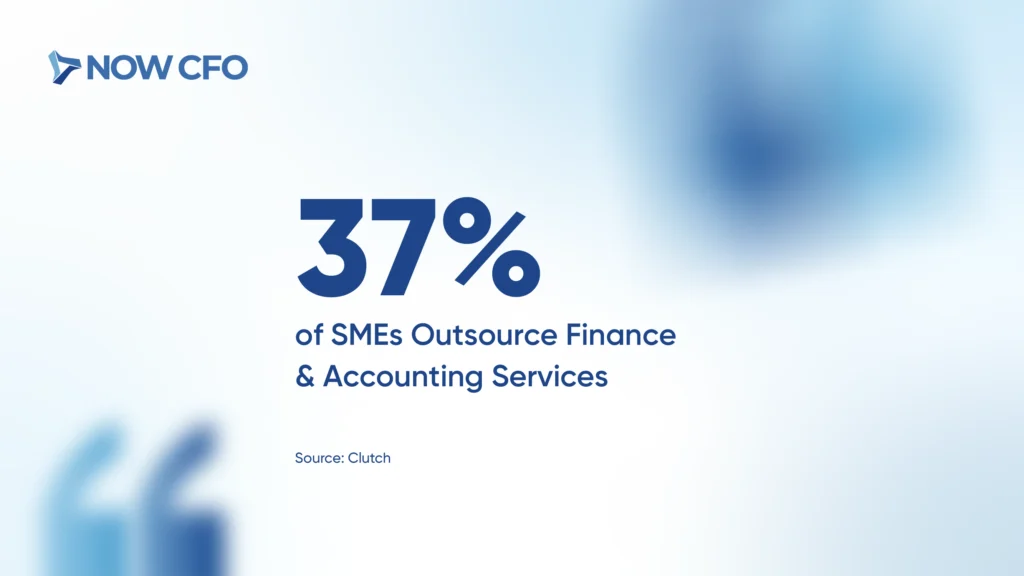
Types of CFO Services (Fractional, Virtual, Outsourced)
Businesses today can choose from various CFO service models based on their operational needs, growth stage, and financial complexity.
- Fractional: Businesses hire part-time, experienced CFOs who provide strategic financial oversight as needed.
- Virtual: A virtual CFO operates remotely using cloud systems to perform budgeting, forecasting, and financial advice on demand.
- Outsourced: Businesses engage external CFO professionals for comprehensive financial management, from reporting to strategic planning and risk mitigation.
Key Functions Performed by CFO Service Providers
CFO service providers take on core financial responsibilities that directly impact a business’s stability and growth. These professionals bring specialized expertise to support decision-making and ensure financial clarity across the organization.
- Drive financial planning and forecasting.
- Strengthen internal controls and risk management.
- Report to stakeholders and support strategic decisions.
Benefits of Using CFO Services for SMBs and Startups
Small businesses and startups often face resource limitations that make full-time financial leadership difficult to justify. CFO services bridge this gap by offering access to expert guidance tailored to a company’s current stage and future vision.
- Equip businesses with premium financial leadership at a fraction of the cost.
- SMEs and startups tap into expert financial strategy without needing to build a full team.
- Outsourced CFOs bring deep experience in compliance, financial forecasting, and risk management, enhancing business agility.
- CFO services scale with growth, supporting fundraising, budgeting, and expansion initiatives.
Limitations of Outsourced CFO Services
While outsourced CFO services offer flexibility and cost-efficiency, they can also present limitations.
- Providers may lack a deep understanding of internal culture and day‑to‑day operations.
- Shared or part‑time arrangements can delay critical decision‑making.
- External CFOs may not always have the authority or visibility to influence internal teams.
What Is an In-House CFO?
An in-house CFO is a full-time executive who works directly within a company to oversee all financial operations. This CFO role offers deep integration into the business, enabling real-time decision-making, long-term planning, and hands-on leadership over the finance team.
Definition and Role of a Full-Time CFO
An in-house CFO is a permanent executive within the organization who holds a key role on the C-suite leadership team. They manage core financial operations, including budgeting, compliance, capital planning, and risk assessment.
Beyond daily financial oversight, a full-time CFO provides valuable institutional knowledge that supports long-term strategy. Their constant presence ensures rapid responsiveness and stronger cultural integration across the business.
Core Responsibilities and Daily Functions
An in-house CFO’s core responsibilities span strategic leadership and hands-on financial management, ensuring stability and growth.
- Drive budgeting and forecasting to support strategic decision-making.
- Monitor liquidity, optimize investment decisions, and secure funding when needed.
- Adhere to financial standards such as GAAP and SOX.
- Establish frameworks to safeguard assets and mitigate financial risks.
- Present financial insights, support strategic planning, and align fiscal actions with business objectives.
Strategic Advantages of Having an In-House CFO
In‑house CFOs develop an intimate understanding of company culture, history, and dynamics, enhancing strategic alignment. Embedded within the executive team, an in‑house CFO responds swiftly to shifting priorities.
In-house CFOs also owns outcomes directly, and support robust in‑house CFO responsibilities such as compliance, risk management, and stakeholder engagement. Moreover, permanent placement ensures continuity in financial planning and regulatory.
Costs and Compensation of Hiring a CFO
Understanding the costs of hiring a CFO is essential for comparing long-term financial commitments against the flexibility of outsourced alternatives.
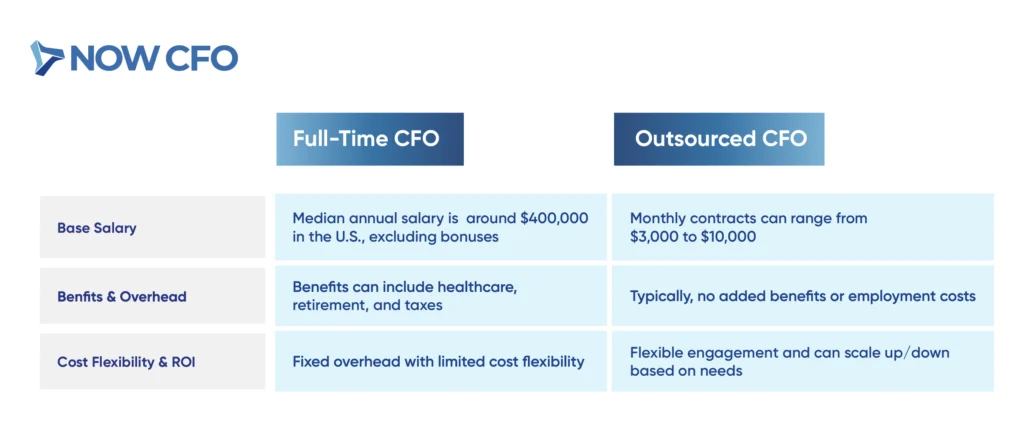
Limitations of Relying Solely on an In-House CFO
Despite their advantages, there are clear limitations to relying solely on an in-house CFO.
- In‑house CFOs excel in core financial functions but can lack expertise in niche areas like tax strategy, risk mitigation, or industry‑specific regulation.
- Relying on a single full‑time CFO risks disruption if they exit.
- Full‑time CFOs carry significant salary, benefits, and overhead costs.
CFO Services vs In-House CFO: Key Differences
Outsourced CFO services provide scalable support tailored to evolving business needs, often at a fraction of the cost of a full-time executive. An in-house CFO offers deeper cultural alignment, constant availability, and direct leadership influence.

Cost Comparison and ROI
Hiring an in‑house CFO typically costs organizations around $400,000 plus benefits annually. In contrast, outsourced CFO services range from $3,000 to $10,000 per month.
Besides, outsourced options offer a lower entry point while delivering strategic financial guidance. Moreover, return on investment accelerates when outsourced CFOs improve forecasts and budgeting efficiency.
Flexibility and Scalability of Services
Outsourced CFO services deliver exceptional flexibility, scaling support up or down precisely as business cycles demand. Clients access CFO-level guidance without long-term commitments, crucial when needs vary month-to-month.
Depth of Expertise and Industry Knowledge
Evaluating the depth of expertise and industry knowledge shows clear differences between outsourced and in-house CFOs. Each brings distinct strengths in skill range and specialization that impact business outcomes.
- Frequently serve multiple sectors, enabling them to import best practices and strategic insights from varied contexts.
- Regulated or technical industries gain value from outsourced CFOs with compliance, risk, and sector-specific financial modeling expertise.
- Many outsourced CFO come with decades of C‑suite experience across startup, scale‑up, and mature company phases..
- Businesses facing funding rounds, M&A, or regulatory shifts gain immediate access to experts.
Availability and Level of Involvement
Outsourced CFOs offer variable availability aligned with business cycles, but may not deliver continuous availability. Many operate on a project basis, covering key deliverables like funding preparation or month-end reviews.
On the other hand, an in‑house CFO provides constant presence. Participating in daily decision-making, immediate issue escalation, and direct team leadership.
High involvement and on-demand accessibility define in‑house CFO responsibilities. Whereas outsourced financial leadership offers flexibility, it comes with trade-offs in terms of immediacy and immersion in company dynamics.
Strategic Alignment With Business Goals
Modern CFOs increasingly position themselves as strategic partners rather than just financial record keeper. Significant alignment between financial oversight and broader business objectives enhances organizational agility.
Additionally, an in‑house CFO often delivers deeper strategic alignment with business objectives. Besides, outsourced CFO services deliver strategic alignment in defined areas but may lack the continuous involvement to ensure comprehensive alignment across evolving company goals.
Learn More: Outsourced CFO vs In-House CFO
Which Option Is Right for Your Business?
Choosing CFO services vs an in-house CFO depends on your company. Startups and SMEs can benefit from the flexibility and lower costs of an outsourced CFO. While highly regulated companies may need an in-house CFO’s constant presence and cultural integration.
Factors to Consider: Size, Stage, and Industry
Several key factors are vital in determining whether outsourced CFO services or an in-house CFO is the right choice.
- Size (Revenue and Employees): Small businesses with limited revenue often rely on lean structures.
- Stage (Startup vs Mature): Early-stage companies typically need flexibility and strategic cash-flow guidance without full-time overhead.
- Industry (Regulation and Complexity): Heavily regulated or technical sectors, like healthcare or manufacturing, benefit from deep industry knowledge of an in‑house CFO.
Questions to Ask Before Making a Decision
Asking the right questions before choosing between CFO services and an in-house CFO ensures that the decision aligns with your business’s unique needs.
- What stage is my business at?
- What are my financial priorities right now?
- How important is cultural fit and daily accessibility?
- Can we clearly define deliverables and success metrics?
- Does the candidate/service have proven experience in my industry or stage?
When CFO Services Make More Sense
Rapidly growing small businesses often lack internal capacity for complex financial leadership. Early-stage founders frequently face bandwidth constraints managing investor relations, planning fundraises, and implementing forecasting systems.
An outsourced CFO service offers timely, strategic, and cost-effective support. Real-time scenario modeling, investor-ready reporting, and systems setup become accessible without the long-term payroll burden.
When an In-House CFO is the Better Fit
An in-house CFO becomes stronger when a business requires continuous leadership, deep organizational integration, and long-term strategic alignment. Companies with complex structures or heavy regulatory requirements benefit from a dedicated executive who can manage complex compliance requirements and challenges.
Full-time CFOs also provide stability in succession planning and maintain institutional knowledge critical for growth. Their daily presence fosters cultural alignment, ensures accountability, and strengthens cross-department collaboration.
Combining Models for Maximum Impact
Organizations using hybrid operating models, combining third-party providers and in-house captives, report greater impact across business outcomes. Hybrid setups enable scalable support and deeper alignment, helping businesses adapt without sacrificing oversight.
Conclusion
Choosing between a CFO service vs in-house CFO comes down to balancing cost, flexibility, expertise, and alignment with long-term goals. For scalability, specialized insights, and freedom from full-time hiring, outsourced CFO service is better.
If your organization is weighing these options, NOW CFO offers a free tailored consultation. Reach out today to explore which path is the right fit for your company’s future.
Many businesses recognize the impact of CFO services, yet only a fraction uses them. Firms working with fractional CFOs report up to a 20% increase in profit. As companies aim for sustainability, CFO expertise becomes essential.
An outsourced CFO delivers actionable insights to businesses preparing for capital raises or pursuing M&A. CFO services enhance transparency, stronger investor relations, and a forward‑looking strategy.
Why Long-Term Growth Requires Financial Leadership
Seamless alignment from strategy to actionable planning drives long-term business success. Active financial leadership sets direction, maintains control, and builds investor trust.
The Role of CFO Services in Shaping Business Vision
To achieve long-term growth, consider how CFO expertise brings clarity and guidance:
- CFO services help align financial strategy with the overarching business vision.
- Reinforce robust internal controls and accurate financial statements.
- With effective bookkeeping and payroll, CFO services support structural alignment.
- Transparent and well-structured reporting enhances credibility for potential capital raises or M&A readiness.
Why Financial Statements Matter for Sustainable Decisions
Accurate financial statements are foundational for the better impact of CFO services, offering insights into profitability, liquidity, and operational trends. These reports enable business leaders to set informed budgets.
Moreover, consistent reporting reveals performance patterns for companies with CFOs who aim for long-term business growth. CFOs use this data to align financial strategy with business goals and prepare for audits, capital raises, or expansion.
Establishing Internal Controls for Long-Term Stability
Satisfactory control can protect assets, enhance financial statement accuracy, and create long-term business growth. CFOs ensure efficient operations through preventative checks and monitoring.
Auditors found 53 serious problems in how some big organizations handle their financial reporting. These issues show that when proper checks aren’t in place, mistakes or fraud can easily occur.
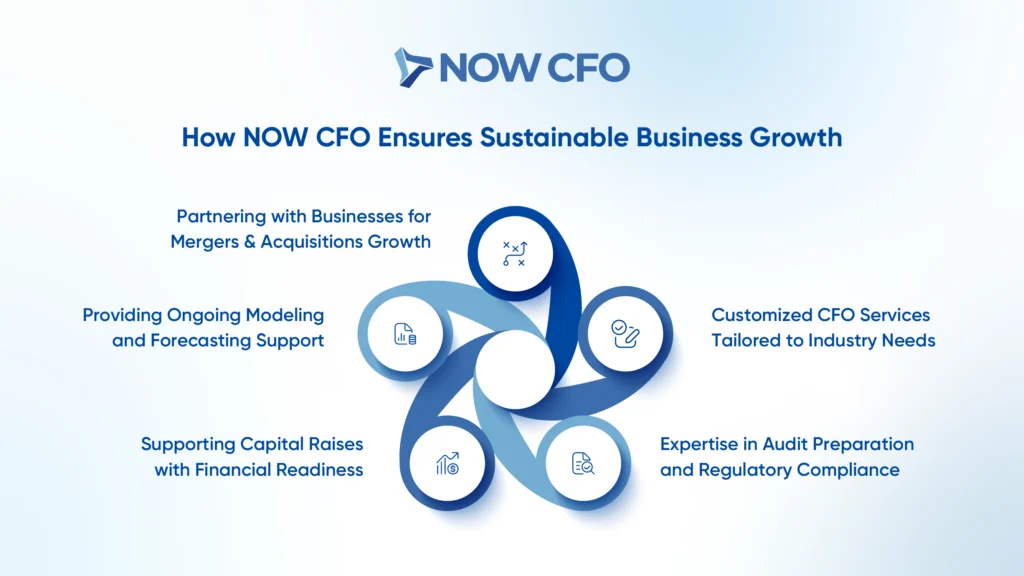
Aligning Financial Operations With Growth Objectives
Effective alignment of financial operations with your company’s expansion goals transforms financial strategy into a growth engine. CFOs embed this alignment by linking budgets, forecasts, and resource deployment with measurable business milestones.
Through a finance strategy, companies can transform operational data into strategic insights and inform investment decisions that align with their long-term vision. Businesses can achieve a lasting impact through tailored financial leadership by consistently monitoring performance.
Building Investor Trust Through Financial Transparency
CFOs play a critical role in enhancing transparency. Financial transparency is the foundation for building investor trust. Today, investors demand more than just balance sheets; they seek assurance that the company operates with integrity.
CFOs help businesses create reports highlighting performance trends, risk exposure, and strategic opportunities. These reports present a consistent narrative of financial health and alignment with vision.
Strategic Benefits of CFO Services for Long-Term Success
Transitioning from the strategic importance of financial leadership, exploring how CFO services turn vision into action is crucial.
Annual Operating Plans that Support Growth Strategies
Annual operating plans lay the actionable roadmap essential for sustainable business expansion:
- Set clear, measurable annual financial goals linked to your long-term vision.
- Align departmental budgets with strategic priorities to ensure efficient resource utilization.
- Provide quarterly performance checkpoints to adapt proactively.
- Integrate regulatory compliance into financial scheduling.
Leveraging Forecasting and Modeling for Market Adaptability
Financial forecasting and modeling are vital tools that enhance strategic planning and decision-making. These models serve as the backbone for businesses, enabling them to anticipate trends, evaluate scenarios, and adjust their strategies promptly.
CFOs drive long-term business growth through robust financial modeling. They also align projections with strategic goals and ensure that planning remains responsive and data-backed.
Moreover, CFOs model revenue, costs, and cash flows under multiple scenarios. Forecasting supports finance teams by enabling them to stress-test budgets and optimize capital deployment.
How CFO Services Improve Audit Preparation and Compliance
CFO services elevate and improve audit preference by embedding rigorous audit protocols. They design financial systems that streamline documentation, maintain regulatory alignment, and facilitate timely audits.
Moreover, financial statement audits have improved operational readiness. A financial report enhances transparency, accountability, and asset management, underscoring the importance of audit preparation.
Scaling Bookkeeping and Payroll Systems Effectively
As companies grow, manual financial processes become unsustainable. CFOs implement integrated systems that automate bookkeeping and payroll, reduce human error, and maintain compliance.
Moreover, these improvements ensure efficient workflows, timely reporting, and real-time visibility into costs and liabilities. With robust systems, businesses can reallocate resources, streamline audits, and manage compensation efficiently.
Positioning Companies for Mergers & Acquisitions
Worldwide, the number of M&A dropped by 9% in the first half of 2025 compared to the same period in 2024. However, the total value of those deals increased by 15%, showing that while there were fewer deals, they were larger and more valuable.
Connecting operational readiness with strategic expansion also prepares businesses to capitalize on merger and acquisition (M&A) opportunities. This strategy can:
- Show clean, scalable financial records to attract buyers.
- Align financial metrics with growth narratives to leverage negotiation.
- Stress-test forecasts to project post‑acquisition performance.
CFO Services and Their Role in Business Transformation
CFO services can shift financial management from reactive responses to a proactive, growth-focused strategy.
Transitioning From Reactive to Proactive Financial Management
CFO services deliver actual value by replacing reactive financial fixes with forward-thinking strategies that anticipate challenges and drive growth. CFOs also implement early-warning systems, forecast future scenarios, and guide resource allocation ahead of demand.
Through scenario planning and rolling forecasts, companies adapt swiftly to market shifts, regulatory changes, or evolving customer behaviors. CFOs embed financial strategy and CFO support into decision-making, ensuring operations align with future goals.
Supporting Capital Raise with Strategic Financial Planning
Most of the capital raised is allocated to larger investment funds, making it more challenging for individual businesses to secure funding in this highly competitive environment. What the CFO does in this situation is:
- Craft detailed financial models that align fundraising with expansion goals.
- Forecast transparent cash flow for investor confidence.
- Maintain compliance with fundraising regulations and disclosures.
- Coordinate due diligence documentation for a smooth capital process.
Driving Efficiency in Business Accounting Functions
Relating proactive financial transformation to operational precision ensures every dollar is tracked effectively and supports long‑term growth.
- Implement cloud-based systems to centralize records and reduce duplication.
- Automate reconciliations to cut manual errors and save time.
- Standardize the chart of accounts for consistency across departments.
- Embed automated alerts for anomalies, improving oversight.
Enhancing Reporting to Meet SEC Compliance Standards
CFOs strengthen reporting frameworks to meet SEC accuracy. They also boost benefits via compliance, reliability, and credibility.
Using advanced tagging systems like Inline XBRL, CFOs can enhance transparency. This transparency ensures timeliness in filings and reduces error exposure, which is critical for outsourced CFO services to achieve scalability and regulatory resilience.
Optimizing Resource Allocation for Future Expansion
Integrating insight with action, CFOs guide deploying smart resources that fuel long-term business growth. Moreover, allocating resources effectively sets the groundwork for sustainable expansion and operational resilience.
CFOs analyze investments, prioritize spending, and redirect funds toward high-yield areas. Strategic allocation supports company growth, ensuring resources are channeled toward initiatives that scale efficiently.
How NOW CFO Ensures Sustainable Business Growth
NOW CFO’s unique strength is the ability to deliver customized CFO services tailored to industry needs.

How NOW CFO Ensures Sustainable Business Growth
- Customized CFO Services Tailored to Industry Needs
- Expertise in Audit Preparation and Regulatory Compliance
- Supporting Capital Raises with Financial Readiness
- Providing Ongoing Modeling and Forecasting Support
- Partnering with Businesses for Mergers & Acquisitions Growth
Customized CFO Services Tailored to Industry Needs
Many businesses outsource roles such as CFOs to gain cost efficiency and flexibility, reflecting the demand for specialized expertise. Delivering targeted financial expertise differentiates NOW CFO by aligning strategy with sector-specific needs.
- Adapt financial frameworks to sector-specific risks and regulations.
- Align performance metrics with your industry’s growth triggers.
- Use specialized forecasting models unique to your market.
- Integrate tailored internal controls to meet the standards of your industry.
Expertise in Audit Preparation and Regulatory Compliance
NOW CFO designs audit documentation and compliance systems that align with industry standards and regulatory deadlines. This report reduces risk, enhances reporting accuracy, and enables long-term business growth.
CFOs apply financial strategy and support to map norm changes, update controls, and coordinate audit-ready workflows. Highlighting how they deliver trust and credibility essential for scalability and investor readiness.
Supporting Capital Raises with Financial Readiness
CFOs coordinate capital readiness through precise planning, compliance, and forecasting. Businesses seeking long-term growth rely on CFO-led modeling and documentation to engage investors strategically.
Through tailored presentations, accurate cap tables, and runway analyses, all align to strengthen funding negotiations. CFOs position the company as a credible, growth-ready partner, demonstrating how outsourced CFO services help companies grow.
Providing Ongoing Modeling and Forecasting Support
Continuous modeling and forecasting create adaptability through informed strategy.
- Update rolling forecasts regularly to respond to market shifts.
- Model scenarios for demand changes, budgets, and cash flow stress tests.
- Incorporate real-time internal and external data for agility.
- Track forecast accuracy and refine assumptions proactively.
Partnering with Businesses for Mergers & Acquisitions Growth
M&A brings companies together with financial readiness and strategic opportunity.
- Prepare detailed financial presentations to support valuation discussions and analysis.
- Ensure clean due diligence by organizing documentation proactively.
- Coordinate with legal and compliance teams to navigate antitrust guidelines.
Conclusion: Why Investing in CFO Services Pays Off Long Term
Understanding the impact of CFO services isn’t just about improving numbers, it’s about securing your business in financial clarity. The insights shared here illustrate how CFO services drive long‑term business growth with CFO services.
If you’re ready to elevate your company’s growth potential, NOW CFO offers a tailored free consultation to suit your stage and industry. Whether you’re preparing for funding, optimizing operations, or planning an acquisition, we stand ready to partner with you.
Frequently Asked Questions
What are the Key Benefits of Using CFO Services for Long-Term Business Growth?
CFO services offer strategic financial planning, enhance reporting accuracy, improve compliance, and help align operations with growth objectives. These strategies contribute to sustainable, scalable business success.
How do Outsourced CFO Services Differ From Hiring a Full-Time CFO?
Outsourced CFOs offer flexible, cost-effective expertise tailored to your needs, while full-time CFOs are permanent hires with broader internal responsibilities. Outsourced solutions are ideal for scaling businesses or those preparing for capital events.
How can CFO Services Support my Business During a Capital Raise or Acquisition?
CFOs ensure your financials are investor-ready and prepare detailed forecasts. CFOs also manage due diligence and align valuation with the strategic growth report.
What Industries Benefit most from strategic CFO services?
CFO services are valuable across sectors, but especially in industries facing rapid growth, stringent regulatory requirements, or complex forecasting needs, such as technology, healthcare, manufacturing, and professional services.
When is the Right Time to Bring in Outsourced CFO Services?
The right time is when your business is growing, preparing for funding, facing compliance challenges, or lacks internal financial leadership. Early engagement ensures better planning and reduced risk.
Cost-saving strategies CFO services can implement aren’t just about cutting back, they’re about spending smarter. A good CFO looks at where your money is going, finds the waste, and helps you keep more profits without hurting the business.
Many companies try to save money by making quick cuts, often leading to bigger problems. A smarter approach is to focus on what’s driving up your costs and fix those areas with a plan.
Review Contracts for Savings
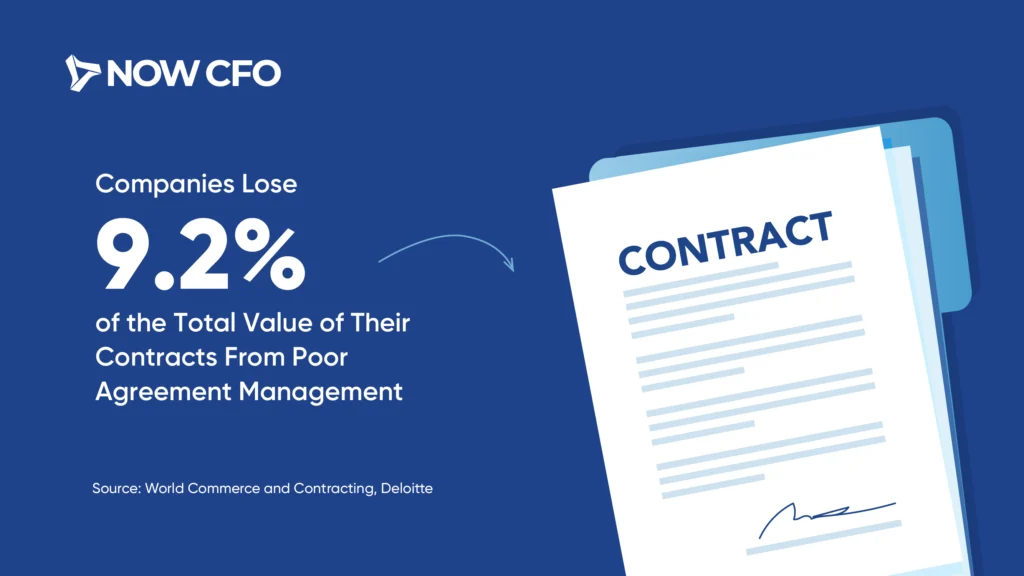
Companies lose about 9.2% of a contract’s value just from not managing agreements well. Missed details, unclear terms, or forgotten renewal dates can quietly drain money without anyone noticing.
CFOs review contracts regularly, catch hidden charges, and work to get better deals. With the proper financial oversight, your business can avoid waste, cut costs, and get more value from every agreement.
Source: World Commerce and Contracting, Deloitte
Optimizing Budget Allocation
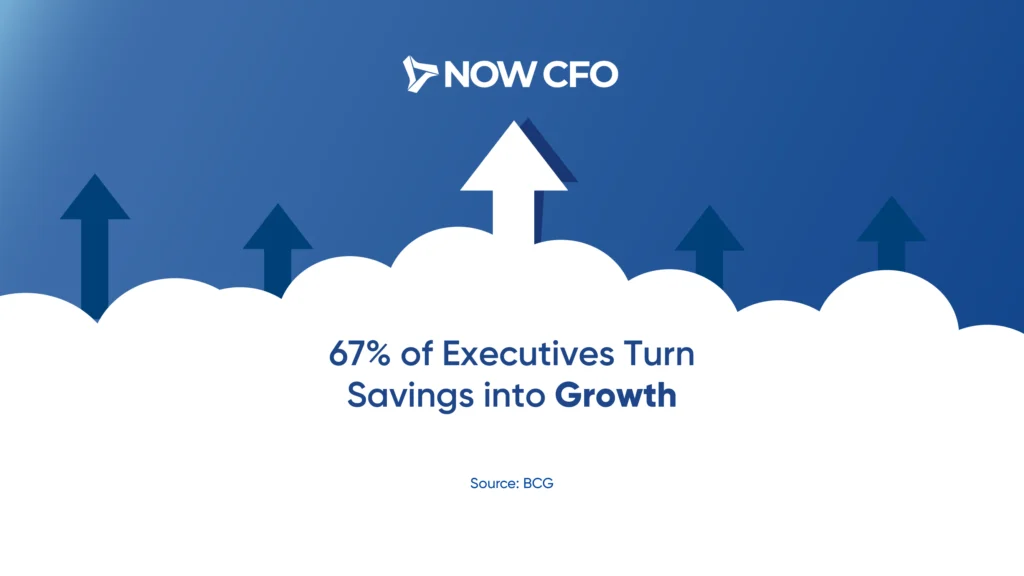
67% of executives reinvest cost savings into other business areas, showing that reducing expenses isn’t just about cutting back but driving smarter growth. When budgets are aligned with strategic goals, companies can amplify returns without increasing total spending.
Additionally, financial efficiency strategies play a key role in this shift. By analyzing past spending and forecasting future needs, CFOs help businesses reallocate resources to the highest-impact areas.
Source: BCG
Reducing Overhead Costs
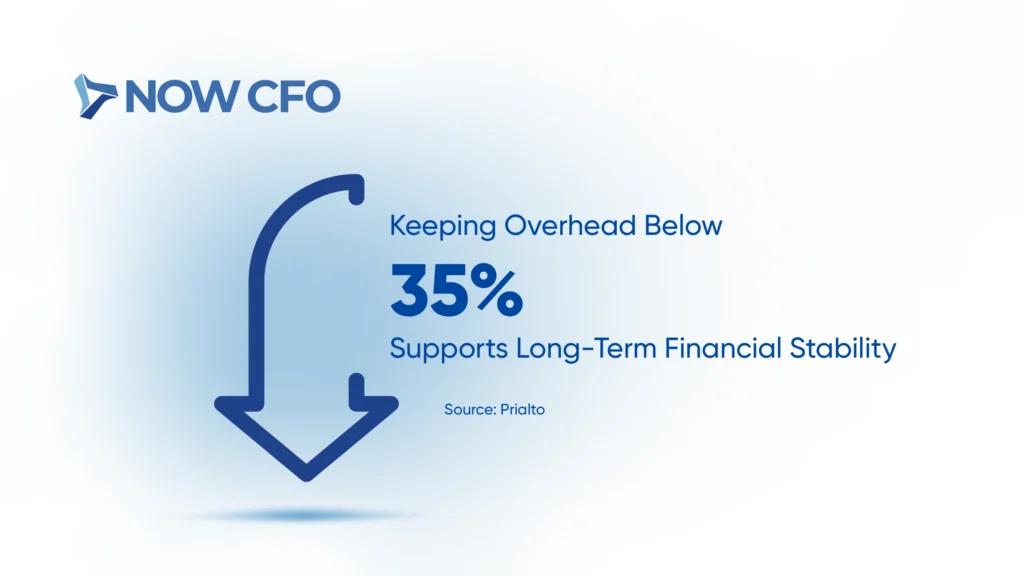
Strong companies aim to keep overhead costs below 35% of total revenue. Staying within this range helps protect profit margins and creates financial stability, especially during periods of growth or uncertainty.
Fractional CFO savings support this goal by reviewing non-operational expenses, such as administrative, office, and support costs. They also help identify areas where spending can be reduced without disrupting daily operations.
Source: Prialto
Using Technology & Automation

79% of CFOs plan to increase AI budgets, and 94% believe generative AI will significantly benefit at least one area of finance. This shift shows how automation is becoming essential to improving accuracy, cutting costs, and streamlining reporting.
Cost management practices can guide companies through this transition by selecting the right tools. CFOs also help customize automation strategies and ensure seamless integration with existing systems.
Source: Bain Capital Ventures
Monitor Cost Drivers to Sustain Savings
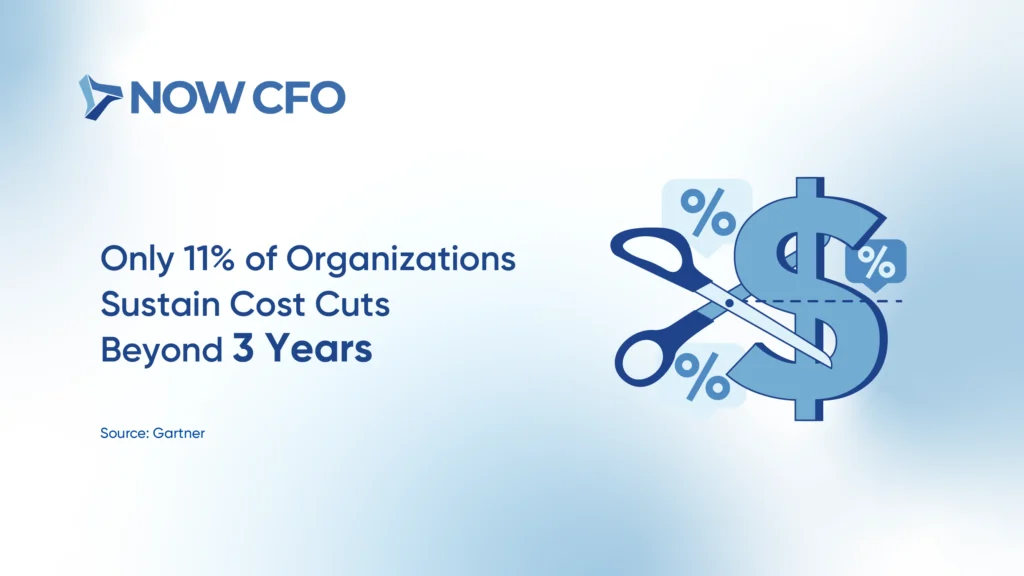
Only 11% of organizations sustain cost reductions beyond three years. This finding highlights a significant challenge: short-term cuts rarely last unless businesses actively monitor what’s driving their expenses.
CFO services regularly check where your money is going, spot areas where costs are creeping up, and make changes before minor problems become big. This constant attention keeps savings in place and helps your business stay financially healthy.
Source: Gartner
Conclusion
Cost-saving strategies CFO services can implement are all about making your business run better without wasting money. Instead of guessing where to cut back, a CFO helps you find real ways to save.
If you’re ready to see where your business can save money and improve how it runs, we’re here to help. You can book a free strategy session! Let’s work together to make your business leaner, stronger, and more profitable, without cutting corners.
Frequently Asked Questions
How can CFO services spot hidden financial inefficiencies?
CFOs use financial reporting, trend analysis, and benchmarking to uncover areas where money is wasted, such as outdated systems, duplicate subscriptions, or poorly negotiated contracts.
What’s the difference between cutting costs and improving cost efficiency?
Cutting costs often means reducing spending across the board. Improving cost efficiency focuses on getting more value from every dollar spent, such as streamlining processes, improving vendor terms, or reallocating budgets to high-performing areas.
Are outsourced CFOs effective for smaller businesses trying to save money?
Yes, outsourced CFOs offer high-level expertise without the full-time salary burden. They bring experience from various industries and can quickly identify savings opportunities tailored to a company’s size and stage.
How soon can a business expect results from CFO-led cost-saving strategies?
Some savings, like renegotiated contracts or automation, can be realized within weeks. Others, such as tax restructuring or strategic budget shifts, may take a quarter or more to fully reflect in the financials.
What tools do CFOs use to monitor and control business spending?
CFOs often rely on dashboards, ERP systems, and AI-powered analytics to track spending in real time, ensuring that cost controls stay in place and that trends are caught early.
Competitive businesses understand that financial clarity isn’t just about balancing the books, but also about enabling smart, scalable growth. The benefits of CFO services go far beyond traditional accounting by offering expert guidance on cash flow, risk, funding, and strategic forecasting.
With markets becoming increasingly unstable and decision-making cycles faster than ever, having the right financial partner is crucial. CFO services offer executive-level insight tailored to a company’s stage, industry, and goals.
CFOs Retire Above the Average Age
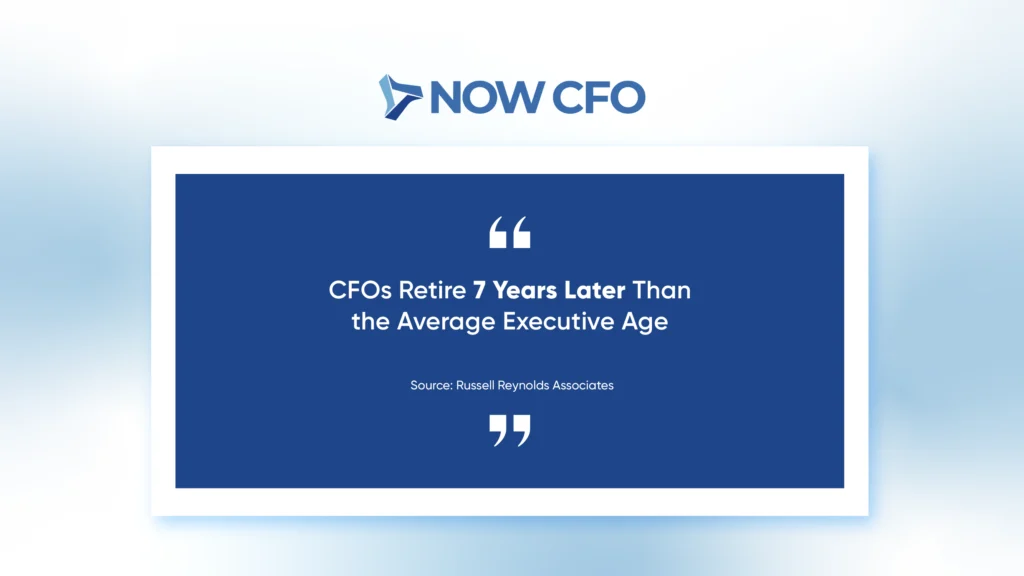
56 percent of CFOs who leave their roles either retire or move into board positions, the highest rate recorded in the past 7 years. This trend highlights how much companies value their CFOs’ experience and continue to rely on their strategic guidance.
A CFO provides this same depth of leadership daily. Unlike external advisors, a full-time CFO is deeply embedded in the company’s operations, aligning strategy, risk management, and financial planning with long-term goals.
Source: Russell Reynolds Associates
Strong Internal Succession Builds Financial Continuity
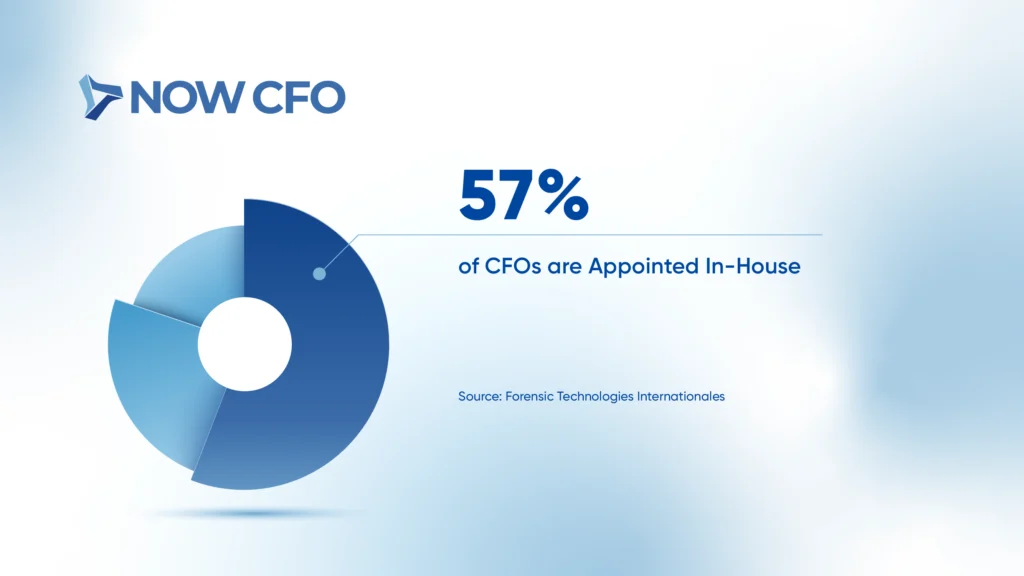
57% of global incoming CFOs were appointed internally. This trend shows that organizations with financial leaders are better positioned for smooth succession, ensuring continuity and stability at the executive level.
A CFO strengthens the leadership pipeline for tomorrow. By grooming internal talent, companies reduce disruption, preserve institutional knowledge, and maintain consistent financial oversight.
Source: Russell Reynolds Associates
Beyond Finance: CFOs as Enterprise-Wide Strategists
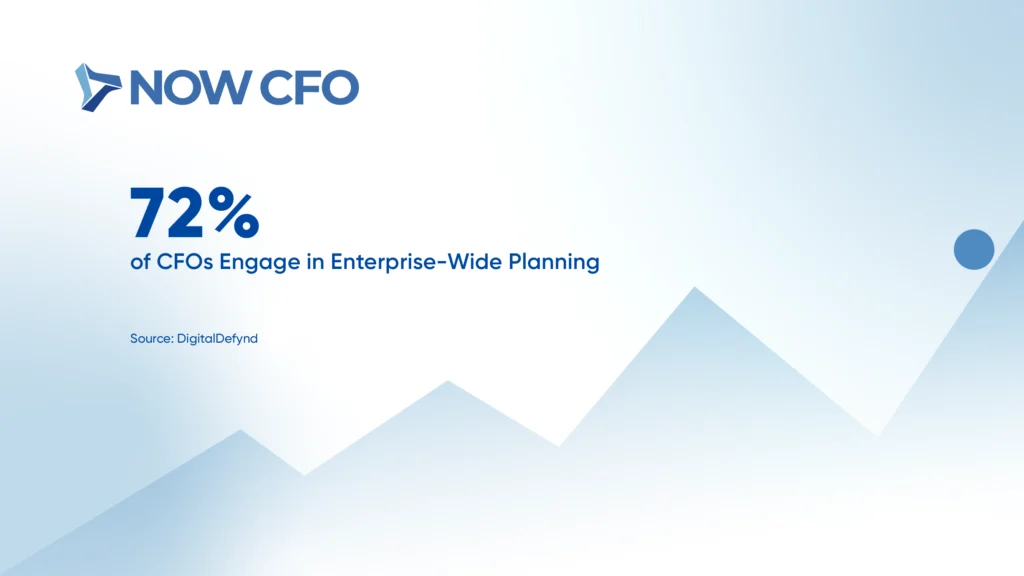
CFOs today do much more than manage finances. In fact, 72% of them now lead strategic planning across the entire organization, not just within the finance department.
Moreover, CFO play a hands-on role in shaping business direction and driving execution. By embedding financial discipline into daily decisions, CFOs help companies stay focused and aligned with long-term objectives.
Source: DigitalDefynd
Using AI and Analytics for Smarter Decisions
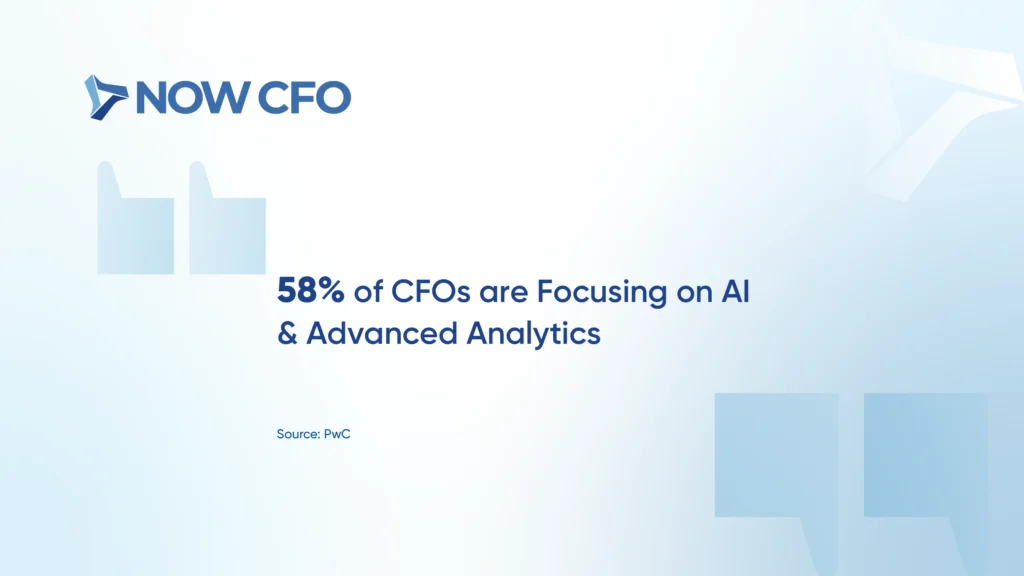
CFOs are increasingly becoming technology leaders, not just financial stewards. 58% of CFOs invest in AI and advanced analytics to adjust planning in today’s volatile environment.
CFOs ensure that these technology investments align directly with the company’s strategy. Embedding AI-driven analytics into financial planning enables more agile responses to shifting market conditions, regulatory pressures, and evolving customer demands.
Source: PwC
Technology as a Cost-Reduction Priority
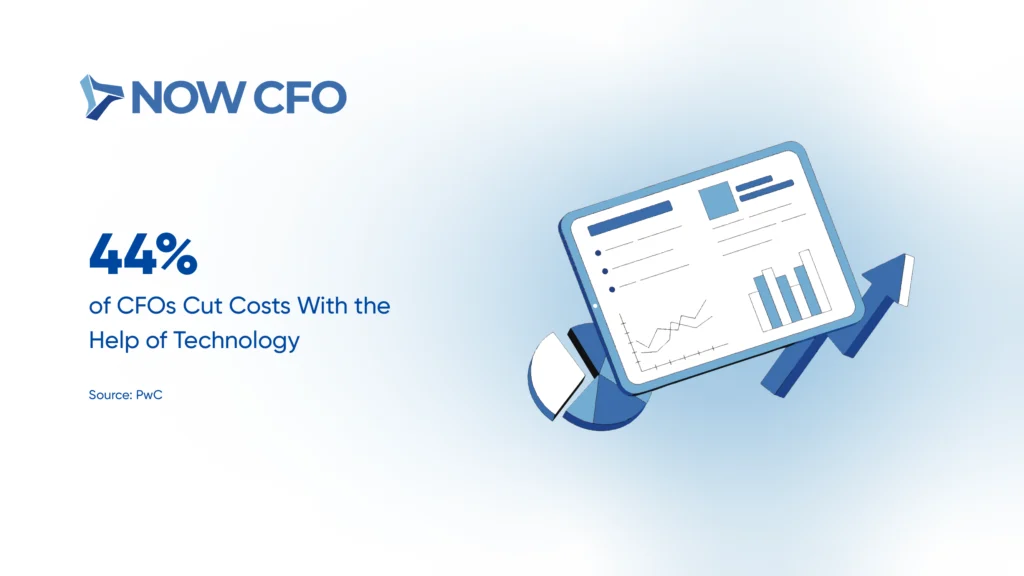
CFOs are placing technology at the core of their cost management strategies. In fact, 44% of CFOs identified expanding technology use to cut costs as a top funding priority for the next 12 months.
As financial leaders, CFOs guide these technology investments to ensure they align with the company’s broader financial goals. By balancing cost reduction with strategic reinvestment, CFOs drive long-term value and position the organization for sustainable growth.
Source: PwC
Capital Allocation Transparency
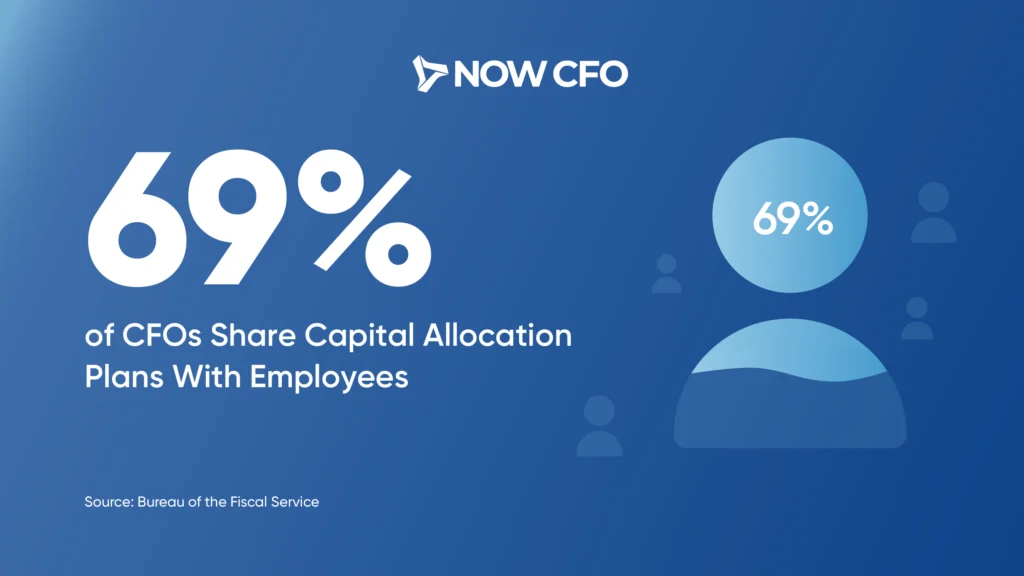
CFOs communicate clearly about capital allocation, enabling employees to understand how the company utilizes its resources. They share these plans to align strategic goals with daily operations, helping teams connect their work to the broader financial picture.
This open communication builds trust and increases engagement across the organization. When employees understand the reasons behind capital decisions, they can actively support key initiatives and contribute to stronger performance and long-term growth.
Source: EY
Conclusion
Ultimately, the benefits of CFO services are grounded not just in numbers but in strategic impact. A visionary CFO brings clarity, financial rigor, and disciplined innovation, all tailored to your business growth.
Ready to amplify your financial horsepower? Explore NOW CFO’s flexible engagement models and schedule a free strategy session for real-time guidance.
Frequently Asked Questions
What Does a CFO Actually Do for a Growing Business?
A CFO helps manage a business’s financial health by overseeing budgeting, forecasting, cash flow, and financial strategy. They also support major decisions, such as fundraising, investments, and cost management, to help the company grow sustainably.
When Should a Business Consider Hiring a CFO?
A business should consider hiring a CFO when it starts scaling, struggles with financial clarity, plans to raise capital, or needs better insight into performance metrics and financial risks.
Are CFO Services Only for Large Companies?
Not at all. Many small and mid-sized businesses use fractional or outsourced CFOs to access senior financial expertise without committing to a full-time salary.
What is the Difference Between a CFO and a Regular Accountant?
An accountant handles day-to-day financial tasks, such as bookkeeping and tax filing. A CFO, on the other hand, focuses on high-level strategy, financial planning, risk management, and long-term goals.
How Can CFO Services Help with Business Growth?
CFO services help identify growth opportunities, enhance decision-making through data-driven insights, manage capital efficiently, and ensure the business is financially prepared to scale.